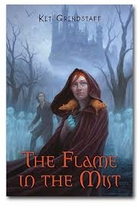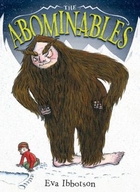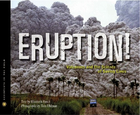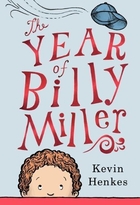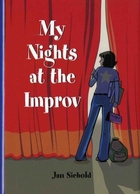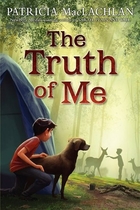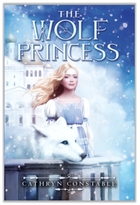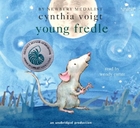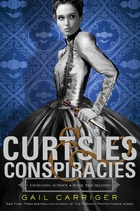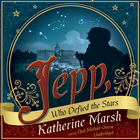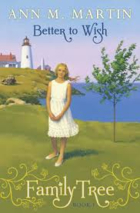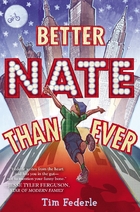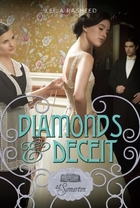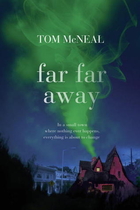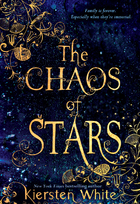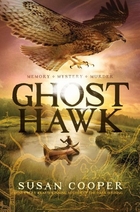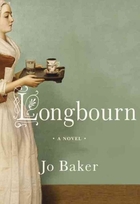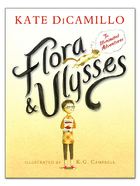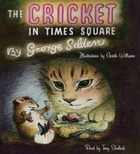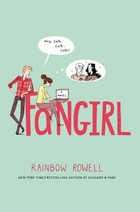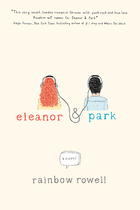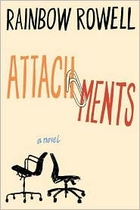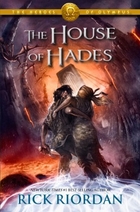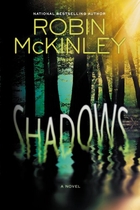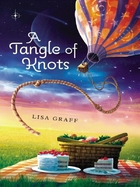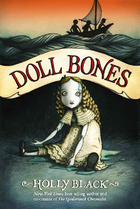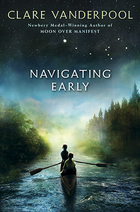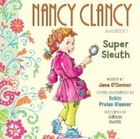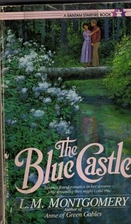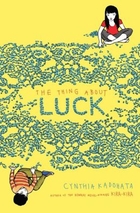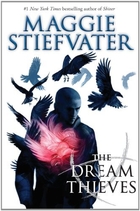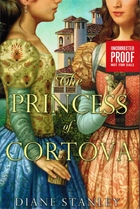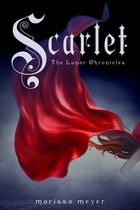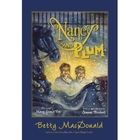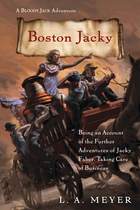A Tinfoil Sky
by Cyndi Sand-Everland was sent to me as a LibraryThing Early Reviewer book several
months ago. In the New Year, I will resolve to do a better job with
reviewing books in a timely manner, but for now, publishers will have to
accept my apologies. Better late than never, right?
Twelve-year-old
Mel and her mother Cecily have bounced around from one place to another
since Mel was very young, and the place they've been living for the
past two months is the worst Mel remembers. So, when Cecily wakes her up
at 3:39 in the morning, shoves a pile of clothes and bedding into Mel's
arms, and hustles her out to the car, Mel is glad to leave. Cecily
announces that they are going home, back to the town where Cecily grew
up and where Cecily's mother Gladys still lives. Mel envisions a warm
and welcoming grandma who will bake cookies and wrap her in a loving
embrace, but the reality is much different. When Mel and Cecily arrive
at Gladys' apartment, Gladys refuses to open the door. Cecily and Mel
live for a while in their broken-down car, parked near the river off the
side of the highway, and Mel stands on the corner and sings to earn a
little spare cash. But one day, Cecily doesn't return to the campsite.
What will become of Mel on her own?
This was a fairly good book,
though I had a few issues with some plot points. While the
characterization was strong, I did find Mel a little too good to be true
at times. Also, while I can't help but like the fact that Mel retreats
to the library for peace and safety because she loves to read, I had a
hard time buying the idea that they would hire her, even for just a few
hours a week, particularly to do preschool story time. Researching
Canadian minimum age laws (I believe the story is set in Canada, though
that's never overtly stated), I see that it is legal in some provinces
to hire 12-year-olds, but it's such a strange thing to do that it just
threw me out of the story. Those plot quibbles weren't enough to keep me
from enjoying the book and finishing it off in one evening, though. If
you enjoy stories about plucky children overcoming bleak circumstances
like poverty and homelessness, this book is for you.
(Reviewed from a finished copy, courtesy of the publisher, via the LibraryThing Early Reviewers program.)
Monday, December 30, 2013
The Flame in the Mist by Kit Grindstaff
The Flame in the Mist by Kit Grindstaff is a rather dark juvenile fantasy.
Jemma grew up as part of the Agromond family, but just hours before her thirteenth birthday, she discovers that she was raised by them for a dark and deadly purpose. Jemma has magical powers, more than she ever realized, and the Agromonds intend to steal them in order to help bolster their own strength, which they use to cloak the land in mist and exert their influence over all of the land's inhabitants. Unless Jemma wants to be part of their dark sorcery, she must flee the castle and seek out her true family. Of course, the Agromonds will not let her go so easily. Can Jemma escape the castle, find her family, and awaken her powers in time to save the kingdom?
I wanted this to be a better story than it was. The cover is eye-catching and the premise is sound, but the writing and characterization don't live up to the book's potential. Jemma makes her way through the story mostly by chance, overhearing key conversations and being rescued multiple times by the few people and creatures in the land who oppose the Agromonds' rule. And she has a magical book that will give her any information she might need, though she is oddly hesitant to use it. The author also over-used anagrams as a puzzle element, in my opinion. Jemma's adventures are unrelentingly dark and gristly; I was exhausted (and often repulsed) just reading about them, but despite the constant adventure and danger, the book dragged along for me. There are probably readers out there who will enjoy this mixture of fantasy and horror, but I don't particularly recommend it unless you are willing to overlook the mediocre writing.
(Reviewed from a finished copy, courtesy of the publisher.)
Jemma grew up as part of the Agromond family, but just hours before her thirteenth birthday, she discovers that she was raised by them for a dark and deadly purpose. Jemma has magical powers, more than she ever realized, and the Agromonds intend to steal them in order to help bolster their own strength, which they use to cloak the land in mist and exert their influence over all of the land's inhabitants. Unless Jemma wants to be part of their dark sorcery, she must flee the castle and seek out her true family. Of course, the Agromonds will not let her go so easily. Can Jemma escape the castle, find her family, and awaken her powers in time to save the kingdom?
I wanted this to be a better story than it was. The cover is eye-catching and the premise is sound, but the writing and characterization don't live up to the book's potential. Jemma makes her way through the story mostly by chance, overhearing key conversations and being rescued multiple times by the few people and creatures in the land who oppose the Agromonds' rule. And she has a magical book that will give her any information she might need, though she is oddly hesitant to use it. The author also over-used anagrams as a puzzle element, in my opinion. Jemma's adventures are unrelentingly dark and gristly; I was exhausted (and often repulsed) just reading about them, but despite the constant adventure and danger, the book dragged along for me. There are probably readers out there who will enjoy this mixture of fantasy and horror, but I don't particularly recommend it unless you are willing to overlook the mediocre writing.
(Reviewed from a finished copy, courtesy of the publisher.)
Sunday, December 29, 2013
The Abominables by Eva Ibbotson
The Abominables by Eva Ibbotson is a posthumously-published work, probably the last from one of my favorite authors.
When Lady Agatha Farlingham is kidnapped by a fearsome creature in the Himalayas, she expects the worst . . . but soon discovers that the yeti family who abducted her are in fact extremely sweet and kind (and strict vegetarians), and just need someone to care for the babies because the mother yeti has died. For nearly a century, Lady Agatha cares for the yetis, teaching them English and proper etiquette. But when resort hotels and ski lodges start encroaching on the secluded valley that the yetis call home, Lady Agatha requests the help of a young boy named Con to remove the yetis to her ancestral home in England. On the overland journey through Asia and Europe, the Abominables have many adventures -- but the one that awaits them in England will be their most challenging yet. . . .
This is a cute and whimsical story, like much of Ibbotson's juvenile fantasy. I prefer her historical romances, but I was glad to read this last story, and can see myself recommending it to children who are looking for a light and funny fantasy.
When Lady Agatha Farlingham is kidnapped by a fearsome creature in the Himalayas, she expects the worst . . . but soon discovers that the yeti family who abducted her are in fact extremely sweet and kind (and strict vegetarians), and just need someone to care for the babies because the mother yeti has died. For nearly a century, Lady Agatha cares for the yetis, teaching them English and proper etiquette. But when resort hotels and ski lodges start encroaching on the secluded valley that the yetis call home, Lady Agatha requests the help of a young boy named Con to remove the yetis to her ancestral home in England. On the overland journey through Asia and Europe, the Abominables have many adventures -- but the one that awaits them in England will be their most challenging yet. . . .
This is a cute and whimsical story, like much of Ibbotson's juvenile fantasy. I prefer her historical romances, but I was glad to read this last story, and can see myself recommending it to children who are looking for a light and funny fantasy.
(Reviewed from an advance copy passed along to me by a friend.)
Saturday, December 21, 2013
Eruption! by Elizabeth Rusch
Eruption! by Elizabeth Rusch is a high-quality juvenile nonfiction book about volcanoes and the scientists who monitor them.
This book tells the story of the Volcano Disaster Assistance Program, an agency formed by the United States Geological Survey and the U.S. Office of Foreign Disaster Assistance. In 1985, the Nevado del Ruiz eruption in Columbia devastated a large area and killed thousands in the nearby town of Armero. While nobody can prevent a volcano from erupting, scientists devoted their efforts to monitoring volcanoes and predicting eruptions, in the hope of minimizing loss of life in the future. This book looks at two eruptions to which the VDAP responded: the 1991 eruption of Mt. Pinatubo in the Philippines, and the 2006 eruption of Mt. Merapi in Indonesia. The book focuses on the collaborative work of the scientists as they coordinate with local scientists and government officials in each region. The VDAP also offers training and support for volcanologists around the globe.
Whenever I read a book from the Scientists in the Field series, I am always favorably impressed at the writing and research in each book. Rusch does a great job of creating tension and narrative flow in an informational text, without compromising the facts contained therein. I learned a lot about volcanoes from this book, and I am sure that readers fascinated by this topic will be completely enthralled.
(Reviewed from a copy borrowed through my library system.)
This book tells the story of the Volcano Disaster Assistance Program, an agency formed by the United States Geological Survey and the U.S. Office of Foreign Disaster Assistance. In 1985, the Nevado del Ruiz eruption in Columbia devastated a large area and killed thousands in the nearby town of Armero. While nobody can prevent a volcano from erupting, scientists devoted their efforts to monitoring volcanoes and predicting eruptions, in the hope of minimizing loss of life in the future. This book looks at two eruptions to which the VDAP responded: the 1991 eruption of Mt. Pinatubo in the Philippines, and the 2006 eruption of Mt. Merapi in Indonesia. The book focuses on the collaborative work of the scientists as they coordinate with local scientists and government officials in each region. The VDAP also offers training and support for volcanologists around the globe.
Whenever I read a book from the Scientists in the Field series, I am always favorably impressed at the writing and research in each book. Rusch does a great job of creating tension and narrative flow in an informational text, without compromising the facts contained therein. I learned a lot about volcanoes from this book, and I am sure that readers fascinated by this topic will be completely enthralled.
(Reviewed from a copy borrowed through my library system.)
Friday, December 20, 2013
The Year of Billy Miller by Kevin Henkes
The Year of Billy Miller by Kevin Henkes is a pleasant book about a second-grade boy.
Billy Miller is not sure if he is ready for second grade. What if he doesn't like his teacher? What if she doesn't like him? What if the bump he got on his head on a family vacation makes it so he can't learn the things he needs to know? Billy has other worries, too: will his artist father ever get his "breakthrough?" Will his little sister always be so annoying? And he has big plans, like the one to say up all night long, and the one to memorize the poem he has to say for Family Day at school. Don't worry, Billy Miller -- you're going to have a great school year!
Kevin Henkes' real strength as a writer lies in creating child characters that are entirely believable and sympathetic. Every time I read one of his books, I think, "Here is a man who remembers exactly what it's like to be a kid." Billy's worries and feelings and plans are so authentic to kids of his age that I'm sure readers will enjoy his story, even though there are no big, exciting events in the plot -- just a string of normal school-year adventures. In that regard, this book reminded me of Beverly Cleary's Ramona books, so readers who enjoy that sort of story will probably like this one, as well.
(Reviewed from a copy borrowed through my library system.)
Billy Miller is not sure if he is ready for second grade. What if he doesn't like his teacher? What if she doesn't like him? What if the bump he got on his head on a family vacation makes it so he can't learn the things he needs to know? Billy has other worries, too: will his artist father ever get his "breakthrough?" Will his little sister always be so annoying? And he has big plans, like the one to say up all night long, and the one to memorize the poem he has to say for Family Day at school. Don't worry, Billy Miller -- you're going to have a great school year!
Kevin Henkes' real strength as a writer lies in creating child characters that are entirely believable and sympathetic. Every time I read one of his books, I think, "Here is a man who remembers exactly what it's like to be a kid." Billy's worries and feelings and plans are so authentic to kids of his age that I'm sure readers will enjoy his story, even though there are no big, exciting events in the plot -- just a string of normal school-year adventures. In that regard, this book reminded me of Beverly Cleary's Ramona books, so readers who enjoy that sort of story will probably like this one, as well.
(Reviewed from a copy borrowed through my library system.)
Tuesday, December 17, 2013
My Nights at the Improv by Jan Siebold
My Nights at the Improv by Jan Siebold is a simple story about an observer of an improv group.
Eighth-grader Lizzie and her mother have recently moved to a new town, and Lizzie is having a little trouble settling in. While her mother teaches a community education class, Lizzie is allowed to wait in the projector room overlooking the auditorium and do her homework. As she waits, she overhears an improv class, part of the same community education program, rehearsing. She is drawn to the activities of the small group, despite the fact that a mean girl from school is part of the improv class. Each week, Lizzie looks forward to seeing what the class will learn . . . and she is able to take those lessons and apply them to her own life.
This was a nice enough story, but a little pat. Lizzie was always able to immediately apply the things she learned in her eavesdropping sessions, and she neither got caught nor decided to ask to join the class. I picked it up at a library book sale because I like reading about theatre and improv, but I found this book just all right, and will probably pass my copy along now that I have read it.
(Reviewed from my personally purchased secondhand copy.)
Eighth-grader Lizzie and her mother have recently moved to a new town, and Lizzie is having a little trouble settling in. While her mother teaches a community education class, Lizzie is allowed to wait in the projector room overlooking the auditorium and do her homework. As she waits, she overhears an improv class, part of the same community education program, rehearsing. She is drawn to the activities of the small group, despite the fact that a mean girl from school is part of the improv class. Each week, Lizzie looks forward to seeing what the class will learn . . . and she is able to take those lessons and apply them to her own life.
This was a nice enough story, but a little pat. Lizzie was always able to immediately apply the things she learned in her eavesdropping sessions, and she neither got caught nor decided to ask to join the class. I picked it up at a library book sale because I like reading about theatre and improv, but I found this book just all right, and will probably pass my copy along now that I have read it.
(Reviewed from my personally purchased secondhand copy.)
Sunday, December 15, 2013
The Truth of Me by Patricia MacLachlan
The Truth of Me by Patricia MacLachlan is a short but deep book about a boy, his dog, and his grandmother.
While Robert's musician parents are on tour, Robert is pleased to stay with Maddy, his eccentric grandmother. Robert's parents are impatient with Maddy's stories, and even her friend and doctor Henry is skeptical, but Robert believes wholeheartedly in Maddy's tales of her adventures with the animals that live in the forest next to her house. Robert has many anxieties, though: will his dog Ellie be good with the animals? Will he ever feel as close to his parents as he does to Maddy? Does his mother love her violin more than she loves Robert?
As with all of MacLachlan's books, this is a quick read written in simple language. The author does an excellent job of providing, with just a few descriptive phrases, reams of information about the characters and the setting, so that readers can easily picture Maddy's cottage and garden, Ellie's hound-dog soulfulness, the campsite in the woods where Robert meets Maddy's wild friends. I know fans of this author will be looking for this book, and it might earn her some new fans, as well.
(Reviewed from a copy borrowed through my library system.)
While Robert's musician parents are on tour, Robert is pleased to stay with Maddy, his eccentric grandmother. Robert's parents are impatient with Maddy's stories, and even her friend and doctor Henry is skeptical, but Robert believes wholeheartedly in Maddy's tales of her adventures with the animals that live in the forest next to her house. Robert has many anxieties, though: will his dog Ellie be good with the animals? Will he ever feel as close to his parents as he does to Maddy? Does his mother love her violin more than she loves Robert?
As with all of MacLachlan's books, this is a quick read written in simple language. The author does an excellent job of providing, with just a few descriptive phrases, reams of information about the characters and the setting, so that readers can easily picture Maddy's cottage and garden, Ellie's hound-dog soulfulness, the campsite in the woods where Robert meets Maddy's wild friends. I know fans of this author will be looking for this book, and it might earn her some new fans, as well.
(Reviewed from a copy borrowed through my library system.)
Saturday, December 14, 2013
Just One Year by Gayle Forman
Just One Year by Gayle Forman is the companion book to her earlier novel, Just One Day, which I reviewed earlier this year.
Willem spent one day in Paris with a girl, and it's messing with his head. Willem has spent a lot of time with a lot of girls, but this one girl, Lulu, is the one he can't forget. The problem is that he went out to get breakfast after their one night together, and got beaten up and hospitalized and just generally delayed, and he lost her. He doesn't know where she went, or even who she is -- "Lulu" is just a nickname he gave her. Over the course of a year, Willem spends a lot of time alternately trying to find Lulu and trying to forget her. Along the way he reconnects with the family he's tried to put behind him and the friends who have supported him all along, rediscovers a passion for acting, and starts to find his way in life. But will he ever reconnect with his Lulu?
As with the last book, I found this one just okay. In the last book, I couldn't get a real sense of Willem's character, so I had a hard time understanding Allyson's fixation on him. Now that I have read this book, I actively dislike him, so it makes it even more difficult for me to root for him to get back together with Lulu/Allyson, a character that I actually did like. Because, let's face it: Willem is kind of a jerk where women are concerned. A charming and apparently handsome one, but a jerk, nonetheless. On the other hand, stepping back from my opinion of the character, this does mean that the writing in this book is good enough to make me care about the characters, and I did find it a quick and fairly engaging read. Fans of realistic YA fiction will probably enjoy these two books, and readers who liked the first book will want to read this one in order to get the other side of the story.
(Reviewed from a copy borrowed through my library system.)
Willem spent one day in Paris with a girl, and it's messing with his head. Willem has spent a lot of time with a lot of girls, but this one girl, Lulu, is the one he can't forget. The problem is that he went out to get breakfast after their one night together, and got beaten up and hospitalized and just generally delayed, and he lost her. He doesn't know where she went, or even who she is -- "Lulu" is just a nickname he gave her. Over the course of a year, Willem spends a lot of time alternately trying to find Lulu and trying to forget her. Along the way he reconnects with the family he's tried to put behind him and the friends who have supported him all along, rediscovers a passion for acting, and starts to find his way in life. But will he ever reconnect with his Lulu?
As with the last book, I found this one just okay. In the last book, I couldn't get a real sense of Willem's character, so I had a hard time understanding Allyson's fixation on him. Now that I have read this book, I actively dislike him, so it makes it even more difficult for me to root for him to get back together with Lulu/Allyson, a character that I actually did like. Because, let's face it: Willem is kind of a jerk where women are concerned. A charming and apparently handsome one, but a jerk, nonetheless. On the other hand, stepping back from my opinion of the character, this does mean that the writing in this book is good enough to make me care about the characters, and I did find it a quick and fairly engaging read. Fans of realistic YA fiction will probably enjoy these two books, and readers who liked the first book will want to read this one in order to get the other side of the story.
(Reviewed from a copy borrowed through my library system.)
The Wolf Princess by Cathryn Constable
The Wolf Princess by Cathryn Constable is a wintery fantasy with the ethereal melancholy of a Russian fairy tale.
Sophie Smith is an orphan, a charity student at a dismal boarding school. Sandwiched between her roommates, the fashionable Delphine and intellectual Marianne, Sophie is almost invisible -- until the day she catches the eye of a visiting Russian woman. Sophie has an inexplicable longing for Russia, and hopes to go there for the school's spring trip, but she knows her absentee guardian will never approve such an expense. When circumstances conspire to allow Sophie and her friends to make the trip, she is pleased (even though the others would rather go someplace warmer than Saint Petersburg). In Russia, Sophie, Delphine, and Marianne are whisked away, not to stay with a host family as expected, but on a train ride through a blizzard to an exquisite but neglected palace deep in the Russian countryside. There, they meet a princess and learn of the tragic past of the Volkonsky family who used to live in the palace. The princess claims to be delighted to have company, and fetes the girls with picnics and skating parties and sleigh rides in the snow, despite the legendary white wolves that haunt the area around the palace. But why have Sophie and her friends been brought there? Is is by chance, or the whim of the princess . . . or is there some darker reason?
I'm a sucker for anything with a Russian feel, so this fantasy is right up my alley. It's not a perfect book -- the characterization is a little flat, and seasoned readers will find the plot twists fairly predictable -- but it does really well with describing the setting and creating atmosphere, well enough in my mind to make up for its other defects. If you're a fan of juvenile fantasy and are looking for a lovely winter read, you should certainly consider this modern fairy tale.
(Reviewed from a copy borrowed through my library system.)
Sophie Smith is an orphan, a charity student at a dismal boarding school. Sandwiched between her roommates, the fashionable Delphine and intellectual Marianne, Sophie is almost invisible -- until the day she catches the eye of a visiting Russian woman. Sophie has an inexplicable longing for Russia, and hopes to go there for the school's spring trip, but she knows her absentee guardian will never approve such an expense. When circumstances conspire to allow Sophie and her friends to make the trip, she is pleased (even though the others would rather go someplace warmer than Saint Petersburg). In Russia, Sophie, Delphine, and Marianne are whisked away, not to stay with a host family as expected, but on a train ride through a blizzard to an exquisite but neglected palace deep in the Russian countryside. There, they meet a princess and learn of the tragic past of the Volkonsky family who used to live in the palace. The princess claims to be delighted to have company, and fetes the girls with picnics and skating parties and sleigh rides in the snow, despite the legendary white wolves that haunt the area around the palace. But why have Sophie and her friends been brought there? Is is by chance, or the whim of the princess . . . or is there some darker reason?
I'm a sucker for anything with a Russian feel, so this fantasy is right up my alley. It's not a perfect book -- the characterization is a little flat, and seasoned readers will find the plot twists fairly predictable -- but it does really well with describing the setting and creating atmosphere, well enough in my mind to make up for its other defects. If you're a fan of juvenile fantasy and are looking for a lovely winter read, you should certainly consider this modern fairy tale.
(Reviewed from a copy borrowed through my library system.)
Friday, December 13, 2013
Young Fredle by Cynthia Voigt
Young Fredle by Cynthia Voigt is the story of a young mouse's unexpected journey.
Fredle is a kitchen mouse. He lives in the nest behind the wall with his extended family, and together they forage in the kitchen and pantry for food every night. The mice live by rules and routines, and any mouse too old or too sick to forage is pushed out of the nest. Fredle expects to live his entire life in the nest, and so he would have, had it not been for an unfortunate encounter with a peppermint patty. The candy is the best thing Fredle has ever tasted, but the chocolate makes him sick -- not sick enough to die, but sick enough that the other mice push him out of the nest onto the pantry floor, where the lady of the house discovers him. Too tenderhearted to just put the cat in to deal with him, she puts Fredle outside -- and thus begins an adventure with field mice and raccoons, snakes and hawks, dogs and chickens, as Fredle tries to get back inside to his home and family. The journey is an eye-opening one for Fredle as he learns about different ways of living and discovers that some of the things he has always been taught are not true at all. Will Fredle find a way home again . . . or will he choose to make a new home for himself?
In reading (or rather, listening to) this story, I was struck by how Fredle's voyage resembles Joseph Campbell's Hero's Journey in many ways. Though he doesn't precisely choose to leave the nest, Fredle does choose to follow the enticing scent of the candy that causes his eventual expulsion, and from there he does meet helpers and face challenges as he attempts to return home. The writing in the story is fairly strong, and Fredle's character, with its defining trait of curiosity, is well-developed. Many of the secondary characters are also strong and interesting in their own right. I listened to the audiobook narrated by Wendy Carter, who does a very nice job of voicing the wide variety of characters Fredle meets.
I'm always bemused at the number of juvenile chapter books that feature mice, but this is a worthy addition to their ranks, one that I will recommend to fans of Beverly Cleary's Ralph and Avi's Poppy.
(Reviewed from an audiobook borrowed through my library system.)
Fredle is a kitchen mouse. He lives in the nest behind the wall with his extended family, and together they forage in the kitchen and pantry for food every night. The mice live by rules and routines, and any mouse too old or too sick to forage is pushed out of the nest. Fredle expects to live his entire life in the nest, and so he would have, had it not been for an unfortunate encounter with a peppermint patty. The candy is the best thing Fredle has ever tasted, but the chocolate makes him sick -- not sick enough to die, but sick enough that the other mice push him out of the nest onto the pantry floor, where the lady of the house discovers him. Too tenderhearted to just put the cat in to deal with him, she puts Fredle outside -- and thus begins an adventure with field mice and raccoons, snakes and hawks, dogs and chickens, as Fredle tries to get back inside to his home and family. The journey is an eye-opening one for Fredle as he learns about different ways of living and discovers that some of the things he has always been taught are not true at all. Will Fredle find a way home again . . . or will he choose to make a new home for himself?
In reading (or rather, listening to) this story, I was struck by how Fredle's voyage resembles Joseph Campbell's Hero's Journey in many ways. Though he doesn't precisely choose to leave the nest, Fredle does choose to follow the enticing scent of the candy that causes his eventual expulsion, and from there he does meet helpers and face challenges as he attempts to return home. The writing in the story is fairly strong, and Fredle's character, with its defining trait of curiosity, is well-developed. Many of the secondary characters are also strong and interesting in their own right. I listened to the audiobook narrated by Wendy Carter, who does a very nice job of voicing the wide variety of characters Fredle meets.
I'm always bemused at the number of juvenile chapter books that feature mice, but this is a worthy addition to their ranks, one that I will recommend to fans of Beverly Cleary's Ralph and Avi's Poppy.
(Reviewed from an audiobook borrowed through my library system.)
Curtsies and Conspiracies by Gail Carriger
Curtsies & Conspiracies by Gail Carriger is the second book in the Finishing School series, and just as much fun as the first!
In this book, Sophronia continues to learn the fine points of etiquette and espionage at Mademoiselle Geraldine's Finishing Academy for Young Ladies of Quality, but many exciting things are afoot. The airship housing the school is traveling to London, and a select group of boys from Bunsen's, their brother school, has come aboard as well. All of the girls are eager for a trip to town (and a chance to flirt with some boys along the way), but Sophronia believes that there is more going on than meets the eye, and she is determined to use her skills to discover exactly what's going on. . . .
This series continues to be highly enjoyable, with steampunk goodness, vampires, werewolves, and espionage. Certainly start with Etiquette & Espionage if you are unfamiliar with the series, but readers who have already read and enjoyed that first book will find this one just as engaging.
(Reviewed from a copy borrowed through my library system.)
In this book, Sophronia continues to learn the fine points of etiquette and espionage at Mademoiselle Geraldine's Finishing Academy for Young Ladies of Quality, but many exciting things are afoot. The airship housing the school is traveling to London, and a select group of boys from Bunsen's, their brother school, has come aboard as well. All of the girls are eager for a trip to town (and a chance to flirt with some boys along the way), but Sophronia believes that there is more going on than meets the eye, and she is determined to use her skills to discover exactly what's going on. . . .
This series continues to be highly enjoyable, with steampunk goodness, vampires, werewolves, and espionage. Certainly start with Etiquette & Espionage if you are unfamiliar with the series, but readers who have already read and enjoyed that first book will find this one just as engaging.
(Reviewed from a copy borrowed through my library system.)
Thursday, December 12, 2013
Jepp, Who Defied the Stars by Katherine Marsh
Jepp, Who Defied the Stars by Katherine Marsh is a fascinating work of historical fiction.
Jepp, a boy with dwarfism, has always been secure in his mother's love. Though he meets a wide variety of travelers who pass through his mother's tavern, he has always been cherished and protected. That changes one day in Jepp's fifteenth year, when a stranger named Don Diego arrives at the tavern. He offers to introduce Jepp to the court of the Spanish Infanta at Brussels, where there are others like Jepp who live a life of luxury. Jepp is torn between the comfort of life at the tavern, and the excitement of life at court, but in the end he decides to travel to the court. Life there is both good and bad -- the Infanta has caused a special wing of the palace to be built for the "court dwarfs," with specially proportioned furniture and fittings. However, the dwarfs are expected to perform to the Infanta and her court in ways that are often humiliating -- for instance, Jepp's first appearance involves jumping out of a pie. Jepp soon makes friends with the other dwarfs, particularly Lia, a lovely young woman near his own age. But Jepp is naive in many ways, and life at court is full of intrigue and danger for those without the power to protect themselves. Jepp will have many adventures over the course of the story, and will often wonder if the course of his life is determined by the stars, or whether he can have a hand in creating his own fate.
I found this story completely absorbing as I listened to the audiobook over the course of a long car trip. It's not a fast-paced read, but instead draws the reader into the richly detailed and carefully researched world of the Spanish Netherlands, circa 1590. I was favorably impressed with the audio production, and I'm sure I'd be mispronouncing the main character's name if I had only read the print version (the "J" is pronounced as "Y," English speakers)! Jepp is a faceted and realistic character, very believable as a teenage boy going from a small, familiar place to a complicated court in a large city, and he definitely matures over the course of the book as he faces a variety of experiences and finds his place in the world. There are all sorts of interesting tidbits about life in the Renaissance as well. If you enjoy historical fiction, I highly recommend this book!
(Reviewed from an e-audiobook, borrowed through my library system.)
Jepp, a boy with dwarfism, has always been secure in his mother's love. Though he meets a wide variety of travelers who pass through his mother's tavern, he has always been cherished and protected. That changes one day in Jepp's fifteenth year, when a stranger named Don Diego arrives at the tavern. He offers to introduce Jepp to the court of the Spanish Infanta at Brussels, where there are others like Jepp who live a life of luxury. Jepp is torn between the comfort of life at the tavern, and the excitement of life at court, but in the end he decides to travel to the court. Life there is both good and bad -- the Infanta has caused a special wing of the palace to be built for the "court dwarfs," with specially proportioned furniture and fittings. However, the dwarfs are expected to perform to the Infanta and her court in ways that are often humiliating -- for instance, Jepp's first appearance involves jumping out of a pie. Jepp soon makes friends with the other dwarfs, particularly Lia, a lovely young woman near his own age. But Jepp is naive in many ways, and life at court is full of intrigue and danger for those without the power to protect themselves. Jepp will have many adventures over the course of the story, and will often wonder if the course of his life is determined by the stars, or whether he can have a hand in creating his own fate.
I found this story completely absorbing as I listened to the audiobook over the course of a long car trip. It's not a fast-paced read, but instead draws the reader into the richly detailed and carefully researched world of the Spanish Netherlands, circa 1590. I was favorably impressed with the audio production, and I'm sure I'd be mispronouncing the main character's name if I had only read the print version (the "J" is pronounced as "Y," English speakers)! Jepp is a faceted and realistic character, very believable as a teenage boy going from a small, familiar place to a complicated court in a large city, and he definitely matures over the course of the book as he faces a variety of experiences and finds his place in the world. There are all sorts of interesting tidbits about life in the Renaissance as well. If you enjoy historical fiction, I highly recommend this book!
(Reviewed from an e-audiobook, borrowed through my library system.)
Wednesday, December 11, 2013
Better to Wish by Ann M. Martin
Better to Wish by Ann M. Martin is the first book in a new middle grade series by Ann M. Martin.
Abby's family lives in a small town on the Maine coast. They don't have a lot of money, but they're better off than many during the Great Depression. Abby's father works hard and is determined to provide a better lifestyle for his family. Unfortunately, this quest brings out hardness and cruelty in his character. Abby's growing-up years are full of both joys and sorrows, and as an adult she reflects that sometimes it's better to wish than to know what lies ahead.
I had high hopes for this series, but they have not been realized in this first book. I found the pacing a little jerky -- the story jumps from one episode in Abby's life to another, sometimes with as much as a year between events. The characters felt more like sketches than actual people to me, and I think a little more time filling things in would have helped make them more real. I also found the ending of the story abrupt and completely unsatisfying. Perhaps this is intended as a cliffhanger, to encourage readers to pick up the next book, but my understanding was that each book would follow a different generation, which means that my questions would only be answered obliquely in the next volume, if at all. This is one I don't see myself recommending, though some readers who like this sort of quiet historical fiction may find the series more enjoyable than I did.
(Reviewed from a copy borrowed through my library system.)
Abby's family lives in a small town on the Maine coast. They don't have a lot of money, but they're better off than many during the Great Depression. Abby's father works hard and is determined to provide a better lifestyle for his family. Unfortunately, this quest brings out hardness and cruelty in his character. Abby's growing-up years are full of both joys and sorrows, and as an adult she reflects that sometimes it's better to wish than to know what lies ahead.
I had high hopes for this series, but they have not been realized in this first book. I found the pacing a little jerky -- the story jumps from one episode in Abby's life to another, sometimes with as much as a year between events. The characters felt more like sketches than actual people to me, and I think a little more time filling things in would have helped make them more real. I also found the ending of the story abrupt and completely unsatisfying. Perhaps this is intended as a cliffhanger, to encourage readers to pick up the next book, but my understanding was that each book would follow a different generation, which means that my questions would only be answered obliquely in the next volume, if at all. This is one I don't see myself recommending, though some readers who like this sort of quiet historical fiction may find the series more enjoyable than I did.
(Reviewed from a copy borrowed through my library system.)
Tuesday, December 10, 2013
Better Nate Than Ever by Tim Federle
Better Nate Than Ever by Tim Federle is a lighthearted story about one crazy day in New York City.
For Nate, life in the Pittsburg suburbs is sheer misery -- he's a theatre-loving thirteen-year-old in a sports-obsessed area. He's fortunate enough to have Libby, a best friend, who loves musicals as much as he does. When she hears about open auditions for an upcoming Broadway show, she hatches a plan to get Nate to New York City for a day so he can try out. Of course, the plan is complicated and relies on several factors over which Nate and Libby have no control, so something is bound to go wrong . . . not to mention that Nate has no real stage experience, or any idea what to expect at a Broadway audition. The big city is a real eye-opener for a kid who thinks that Applebees is the height of haute cuisine. As Nate wanders haplessly through New York City, readers will be on the edge of their seats: Will Nate make it to the audition and live to tell the tale?
This is a really fun light read, recommended for fans of broadway musicals. It touches on some deeper issues in Nate's life, but in a lighthearted and humorous way, and none of the really terrible things that could happen to a kid on his own in a big city actually happen. I'd recommend this, especially if you love Broadway and/or NYC.
(Reviewed from a copy borrowed through my library system.)
For Nate, life in the Pittsburg suburbs is sheer misery -- he's a theatre-loving thirteen-year-old in a sports-obsessed area. He's fortunate enough to have Libby, a best friend, who loves musicals as much as he does. When she hears about open auditions for an upcoming Broadway show, she hatches a plan to get Nate to New York City for a day so he can try out. Of course, the plan is complicated and relies on several factors over which Nate and Libby have no control, so something is bound to go wrong . . . not to mention that Nate has no real stage experience, or any idea what to expect at a Broadway audition. The big city is a real eye-opener for a kid who thinks that Applebees is the height of haute cuisine. As Nate wanders haplessly through New York City, readers will be on the edge of their seats: Will Nate make it to the audition and live to tell the tale?
This is a really fun light read, recommended for fans of broadway musicals. It touches on some deeper issues in Nate's life, but in a lighthearted and humorous way, and none of the really terrible things that could happen to a kid on his own in a big city actually happen. I'd recommend this, especially if you love Broadway and/or NYC.
(Reviewed from a copy borrowed through my library system.)
Monday, December 9, 2013
Diamonds and Deceit by Leila Rasheed
Diamonds & Deceit by Leila Rasheed is the second book in the At Somerton series. I had some issues
with the first book in the series and didn't intend to read on, but I
was given an e-galley by the publisher, so I figured I'd see if the
series could redeem itself. I'm going to have to include spoilers for Cinders & Sapphires in the following review . . . you've been warned.
In this book, Rose is caught between two worlds: she is not made welcome in polite society despite her new status, but neither is she allowed to return to her comfort zone below stairs. When she meets and enigmatic, artistic peer, she finds him unconventional and attractive, but so far above her that there's no question of a romance between them. Can they at least be friends, despite a few initial blunders? Meanwhile, Lady Ada has determined to accept a socially acceptable (and lucrative) proposal, putting her love for the Indian student Ravi behind her in order to save her family from further disgrace. But can she really deny her heart?
I'm a little mollified by the events of this book -- there was some fallout from the stuff that bothered me in the first book, which made it a little more realistic than the happy-sappy ending of Cinders & Sapphires promised. However, there's still nothing that elevates the writing above the common run of period romances, and the plot is fairly predictable. Readers looking for Downton Abbey readalikes may want to consider this series, but don't expect it to transcend its genre.
(Reviewed from an e-galley, courtesy of the publisher.)
In this book, Rose is caught between two worlds: she is not made welcome in polite society despite her new status, but neither is she allowed to return to her comfort zone below stairs. When she meets and enigmatic, artistic peer, she finds him unconventional and attractive, but so far above her that there's no question of a romance between them. Can they at least be friends, despite a few initial blunders? Meanwhile, Lady Ada has determined to accept a socially acceptable (and lucrative) proposal, putting her love for the Indian student Ravi behind her in order to save her family from further disgrace. But can she really deny her heart?
I'm a little mollified by the events of this book -- there was some fallout from the stuff that bothered me in the first book, which made it a little more realistic than the happy-sappy ending of Cinders & Sapphires promised. However, there's still nothing that elevates the writing above the common run of period romances, and the plot is fairly predictable. Readers looking for Downton Abbey readalikes may want to consider this series, but don't expect it to transcend its genre.
(Reviewed from an e-galley, courtesy of the publisher.)
Far Far Away by Tom McNeal
Far Far Away
by Tom McNeal is assigned reading for a seminar I'm attending in
January. I can already tell that I'm going to have a hard time
discussing it critically . . . because I loved it so much!
Jacob Grimm may have died in 1863, but his spirit is doomed to wander until he figures out what it is he has left undone. After some years of roaming, he finds a boy in a small town who is one of the few in the world who can hear the voices of ghosts. Jacob knows that there is also in Jeremy's small town a Finder of Occasions, who will do Jeremy harm if left unchecked. If Jacob can protect Jeremy and encourage him to excel in school and go away to college, Jacob reasons, he can perhaps move on himself, to whatever comes next. Of course, it won't be that easy. . . .
I'm over-simplifying the plot with that summary, and certainly not doing it justice. This book has magic, humor, suspense, and romance. The characters are excellent, the writing is brilliant, and I didn't figure out who the Finder of Occasions was until fairly late in the story, though perhaps a savvier reader would have caught on sooner, since there are some nice fairy-tale related clues dropped with gentle precision at key points. There are some dark parts to the story, as well -- I wouldn't recommend it to kids, necessarily, but readers from middle school up who love magical realism and fairy-tale references should definitely read this book!
This is one of my rare five-star reads, and will definitely be among my favorites for the year.
(Reviewed from a copy borrowed through my library system.)
Jacob Grimm may have died in 1863, but his spirit is doomed to wander until he figures out what it is he has left undone. After some years of roaming, he finds a boy in a small town who is one of the few in the world who can hear the voices of ghosts. Jacob knows that there is also in Jeremy's small town a Finder of Occasions, who will do Jeremy harm if left unchecked. If Jacob can protect Jeremy and encourage him to excel in school and go away to college, Jacob reasons, he can perhaps move on himself, to whatever comes next. Of course, it won't be that easy. . . .
I'm over-simplifying the plot with that summary, and certainly not doing it justice. This book has magic, humor, suspense, and romance. The characters are excellent, the writing is brilliant, and I didn't figure out who the Finder of Occasions was until fairly late in the story, though perhaps a savvier reader would have caught on sooner, since there are some nice fairy-tale related clues dropped with gentle precision at key points. There are some dark parts to the story, as well -- I wouldn't recommend it to kids, necessarily, but readers from middle school up who love magical realism and fairy-tale references should definitely read this book!
This is one of my rare five-star reads, and will definitely be among my favorites for the year.
(Reviewed from a copy borrowed through my library system.)
Thursday, December 5, 2013
The Chaos of Stars by Kiersten White
The Chaos of Stars by Kiersten White is a fun, snarky read featuring Egyptian mythology in a modern setting.
Isadora is the mortal daughter of Egyptian gods, and she's kind of bitter about it. After all, what's the use of one mortal lifetime in comparison with her family's eternal years? In dealing with her moody teenage daughter while preparing for the birth of another child, Isis sends Isadora from Egypt to America to spend time with Sirus, Isadora's older (but also mortal) brother. But to keep her still involved with family concerns, Isis arranges for Isadora to volunteer at a museum that will be hosting an exhibit of art and sculpture belonging to Isadora's family. While working at the museum, Isadora makes friends with Tyler, a cheerful girl who is also volunteering there. She also meets handsome, brooding Ry -- but Isadora is determined not to fall in love, so she can just be friends with him, right? Life in California is not all parties on the beach and romantic tension, however: unexpected dangers await Isadora, and disturbing dreams point to trouble for her mother back in Egypt. Isadora is irritated at her mother, true, but she doesn't want any real harm to come to her . . . but who could harm a goddess?
This is a light, fluffy read, but it does a lot of things well. I'm no Egyptian mythology buff, but Isadora's brief explanations of life with her crazy family made the complex myths interesting and comprehensible to even a casual reader. The romance aspect of the plot was predictable but probably still enjoyable for most readers, and the mystery not too terribly obvious. Characters are well-written and likeable -- I was particularly fond of Sirus and Tyler. The dialogue and Isadora's snarky inner voice are the real stars of the book. If you like light reads with romance and mythology, and don't mind just a little teen angst, give this book a try.
(Reviewed from a copy borrowed through my library system.)
Isadora is the mortal daughter of Egyptian gods, and she's kind of bitter about it. After all, what's the use of one mortal lifetime in comparison with her family's eternal years? In dealing with her moody teenage daughter while preparing for the birth of another child, Isis sends Isadora from Egypt to America to spend time with Sirus, Isadora's older (but also mortal) brother. But to keep her still involved with family concerns, Isis arranges for Isadora to volunteer at a museum that will be hosting an exhibit of art and sculpture belonging to Isadora's family. While working at the museum, Isadora makes friends with Tyler, a cheerful girl who is also volunteering there. She also meets handsome, brooding Ry -- but Isadora is determined not to fall in love, so she can just be friends with him, right? Life in California is not all parties on the beach and romantic tension, however: unexpected dangers await Isadora, and disturbing dreams point to trouble for her mother back in Egypt. Isadora is irritated at her mother, true, but she doesn't want any real harm to come to her . . . but who could harm a goddess?
This is a light, fluffy read, but it does a lot of things well. I'm no Egyptian mythology buff, but Isadora's brief explanations of life with her crazy family made the complex myths interesting and comprehensible to even a casual reader. The romance aspect of the plot was predictable but probably still enjoyable for most readers, and the mystery not too terribly obvious. Characters are well-written and likeable -- I was particularly fond of Sirus and Tyler. The dialogue and Isadora's snarky inner voice are the real stars of the book. If you like light reads with romance and mythology, and don't mind just a little teen angst, give this book a try.
(Reviewed from a copy borrowed through my library system.)
Wednesday, December 4, 2013
Ghost Hawk by Susan Cooper
Ghost Hawk by Susan Cooper is an historical fantasy set in colonial America in the years leading up to King Philip's War.
When Little Hawk leaves his village for a winter in the wilderness, a rite of passage that every Wampanoag boy must face. When he returns, however, it is to find that nearly the whole village has succumbed to a fever spread from the white traders who have recently come to the region. As Little Hawk and the few survivors are incorporated into another village which has also seen losses from the fever, by chance he meets John Wakely, a boy a few years younger than himself. Little Hawk will meet John Wakely once again in his lifetime, and that meeting will change both boys' lives in profound and startling ways.
This is a gripping read that deals with an historical period that may be unfamiliar to some readers. Life in Little Hawk's Wampanoag village is respectfully described, and the conflicts between the settlers over issues of church and state are shown in dramatic and interesting ways. While the book has its flaws -- for instance, I thought a character that appears toward the end of the book was too obviously a stand-in for the author -- I found it an enjoyable read overall, and would recommend it to readers who enjoy similar types of stories.
(Reviewed from a copy borrowed through my library system.)
When Little Hawk leaves his village for a winter in the wilderness, a rite of passage that every Wampanoag boy must face. When he returns, however, it is to find that nearly the whole village has succumbed to a fever spread from the white traders who have recently come to the region. As Little Hawk and the few survivors are incorporated into another village which has also seen losses from the fever, by chance he meets John Wakely, a boy a few years younger than himself. Little Hawk will meet John Wakely once again in his lifetime, and that meeting will change both boys' lives in profound and startling ways.
This is a gripping read that deals with an historical period that may be unfamiliar to some readers. Life in Little Hawk's Wampanoag village is respectfully described, and the conflicts between the settlers over issues of church and state are shown in dramatic and interesting ways. While the book has its flaws -- for instance, I thought a character that appears toward the end of the book was too obviously a stand-in for the author -- I found it an enjoyable read overall, and would recommend it to readers who enjoy similar types of stories.
(Reviewed from a copy borrowed through my library system.)
Hero by Alethea Kontis
Hero by Alethea Kontis is the second book about the Woodcutter sisters. This book focuses on Saturday, the second-youngest.
When Saturday Woodcutter accidentally calls an ocean into being where her front yard used to be, she finds herself on the adventure she's always dreamed of. With her enchanted sword in hand, she faces pirates and sea monsters and a sly and irritable mountain witch who takes her captive, mistaking Saturday for Jack Woodcutter, the brother Saturday thought was long dead. Also held captive by the witch is a young man named Peregrine, whom the witch thinks is her dutiful daughter (the witch has lost her eyes, leading to all of these cases of mistaken identity). Can Saturday and Peregrine escape the witch's clutches without waking the dragon that slumbers beneath the mountain? And does romance have to be part of the adventure?
I'm really enjoying this series, which takes storylines from various fairy tales and legends and combines them into the lives of one large family. Saturday's story is more of a typical fantasy adventure and less of a fairy-tale mashup than Sunday's story (Enchanted) was, but it's still a fun read with intriguing bits and pieces of fairy tales tossed in, no doubt to be expanded upon in future volumes. And I, for one, can hardly wait to read them!
(Reviewed from a copy borrowed through my library system.)
When Saturday Woodcutter accidentally calls an ocean into being where her front yard used to be, she finds herself on the adventure she's always dreamed of. With her enchanted sword in hand, she faces pirates and sea monsters and a sly and irritable mountain witch who takes her captive, mistaking Saturday for Jack Woodcutter, the brother Saturday thought was long dead. Also held captive by the witch is a young man named Peregrine, whom the witch thinks is her dutiful daughter (the witch has lost her eyes, leading to all of these cases of mistaken identity). Can Saturday and Peregrine escape the witch's clutches without waking the dragon that slumbers beneath the mountain? And does romance have to be part of the adventure?
I'm really enjoying this series, which takes storylines from various fairy tales and legends and combines them into the lives of one large family. Saturday's story is more of a typical fantasy adventure and less of a fairy-tale mashup than Sunday's story (Enchanted) was, but it's still a fun read with intriguing bits and pieces of fairy tales tossed in, no doubt to be expanded upon in future volumes. And I, for one, can hardly wait to read them!
(Reviewed from a copy borrowed through my library system.)
Tuesday, November 26, 2013
Longbourn by Jo Baker
Longbourn by Jo Baker tells a story that bustles behind and beneath the familiar world of Pride and Prejudice.
Sarah was an orphan before the housekeeper at Longbourn took her on as a housemaid. Now she scrubs floors, does laundry, helps prepare meals, and does dozens of other tasks for the members of the Bennet family. Sarah sometimes dreams of more -- of being a lady, or at least, not a servant -- but Longbourn is a good place, all in all, and Sarah is lucky to be there. When a new footman is hired, a taciturn man with a mysterious past, Sarah is at first intrigued, and then, when he seems to snub her in favor of keeping to himself, disdainful. Another man, a servant of Mr. Bingley who has recently arrived in the neighborhood, also fascinates Sarah, as he has ambitions beyond his current station. Will he be Sarah's ticket to freedom, or does happiness lie with the enigmatic but undeniably attractive footman?
One of the fascinating things about this story is the way it ties in to the familiar events of Pride and Prejudice, but does not tell that story from a different perspective. Those looking for a below-stairs view of Elizabeth and Mr. Darcy's romance may be disappointed; Sarah has plenty going on in her own life, and the concerns of her employers take a backseat to matters of her own heart. The Bennets, though generally portrayed as kind employers, are also exposed in some of the foibles that only servants would be privy to. And, of course, some events in P&P have more of a bearing on the servants' hall than others: the visit of Mr. Collins is a noteworthy affair, since he will someday be the servants' employer, and could decide to summarily fire all of them when he takes possession of the house if he is not suitably impressed by the quality of service!
I found this a highly enjoyable book, well-written and well-researched. If you are an Austenophile or generally interested in historical fiction about ordinary people, I certainly recommend this book.
(Reviewed from a copy borrowed through my library system.)
Sarah was an orphan before the housekeeper at Longbourn took her on as a housemaid. Now she scrubs floors, does laundry, helps prepare meals, and does dozens of other tasks for the members of the Bennet family. Sarah sometimes dreams of more -- of being a lady, or at least, not a servant -- but Longbourn is a good place, all in all, and Sarah is lucky to be there. When a new footman is hired, a taciturn man with a mysterious past, Sarah is at first intrigued, and then, when he seems to snub her in favor of keeping to himself, disdainful. Another man, a servant of Mr. Bingley who has recently arrived in the neighborhood, also fascinates Sarah, as he has ambitions beyond his current station. Will he be Sarah's ticket to freedom, or does happiness lie with the enigmatic but undeniably attractive footman?
One of the fascinating things about this story is the way it ties in to the familiar events of Pride and Prejudice, but does not tell that story from a different perspective. Those looking for a below-stairs view of Elizabeth and Mr. Darcy's romance may be disappointed; Sarah has plenty going on in her own life, and the concerns of her employers take a backseat to matters of her own heart. The Bennets, though generally portrayed as kind employers, are also exposed in some of the foibles that only servants would be privy to. And, of course, some events in P&P have more of a bearing on the servants' hall than others: the visit of Mr. Collins is a noteworthy affair, since he will someday be the servants' employer, and could decide to summarily fire all of them when he takes possession of the house if he is not suitably impressed by the quality of service!
I found this a highly enjoyable book, well-written and well-researched. If you are an Austenophile or generally interested in historical fiction about ordinary people, I certainly recommend this book.
(Reviewed from a copy borrowed through my library system.)
Monday, November 25, 2013
Flora & Ulysses by Kate DiCamillo
Flora and Ulysses: The Illuminated Adventures by Kate DiCamillo is a quirky story about a comic-book-obsessed girl and her poetry-loving squirrel.
Flora Belle Buckman is a cynic -- but even she is amazed when she sees a squirrel get sucked into a vacuum cleaner, and emerge triumphant. The ability to escape almost certain death by vacuum proves to be only one of Ulysses the Squirrel's extraordinary abilities. Of course, he has enemies, too . . .
To tell the truth, the plot of this story is not what sticks with me after reading -- it's the quirkiness that makes an impression. Amid the wacky squirrel-related adventures, there are some deeper musings on philosophical questions of life and love, elevating this above the level of "just another crazy superhero book." I liked it well enough, but did not love it.
(Reviewed from a copy borrowed through my library system.)
Flora Belle Buckman is a cynic -- but even she is amazed when she sees a squirrel get sucked into a vacuum cleaner, and emerge triumphant. The ability to escape almost certain death by vacuum proves to be only one of Ulysses the Squirrel's extraordinary abilities. Of course, he has enemies, too . . .
To tell the truth, the plot of this story is not what sticks with me after reading -- it's the quirkiness that makes an impression. Amid the wacky squirrel-related adventures, there are some deeper musings on philosophical questions of life and love, elevating this above the level of "just another crazy superhero book." I liked it well enough, but did not love it.
(Reviewed from a copy borrowed through my library system.)
Sunday, November 24, 2013
Republic of Thieves by Scott Lynch
I've eagerly anticipated Republic of Thieves by Scott Lynch.
If there's one group of people Locke Lamora is unlikely to want to work for, it is the Bondsmagi of Karthain. (Readers of previous volumes will know why!) But when they make him an offer that he literally can't refuse, he finds himself embroiled in Karthaki politics, facing off against none other than Sabetha -- a former member of Locke's gang, and Locke's first love. There's a lot of history between the two of them, and the political battle that the Bondsmagi have set up is quite real; neither can afford to expend anything less than their best effort. Who will triumph -- and will the cost of the battle be, once again, their friendship?
There are two stories being told here: the present Karthaki elections caper, and the past story from when Locke, Sabetha, and the gang were teenagers. I find that I liked this book better than a lot of reviewers -- both stories seemed strong to me, whereas in the past when Lynch has used flashbacks, they have generally only served the present-day storyline. In this case, the flashback story may actually be the stronger of the two, as the present-day storyline is pretty similar to what we've seen before: Locke is unwillingly roped in to working for a more powerful person or entity and must strain his reserves to make it out alive. The best thing about the present-day story is Sabetha. For once, Locke Lamora may not be the cleverest person in the room! And since the flashback story focuses on theatre -- a type of theatre not too far removed from our world's English Renaissance theatre -- I was bound to like it.
The book ends with a couple of minor twists and revelations, setting up for the next volume in the series without leaving us with the sort of cliffhanger that concluded Red Seas Under Red Skies.
(Reviewed from a copy borrowed through my library system.)
If there's one group of people Locke Lamora is unlikely to want to work for, it is the Bondsmagi of Karthain. (Readers of previous volumes will know why!) But when they make him an offer that he literally can't refuse, he finds himself embroiled in Karthaki politics, facing off against none other than Sabetha -- a former member of Locke's gang, and Locke's first love. There's a lot of history between the two of them, and the political battle that the Bondsmagi have set up is quite real; neither can afford to expend anything less than their best effort. Who will triumph -- and will the cost of the battle be, once again, their friendship?
There are two stories being told here: the present Karthaki elections caper, and the past story from when Locke, Sabetha, and the gang were teenagers. I find that I liked this book better than a lot of reviewers -- both stories seemed strong to me, whereas in the past when Lynch has used flashbacks, they have generally only served the present-day storyline. In this case, the flashback story may actually be the stronger of the two, as the present-day storyline is pretty similar to what we've seen before: Locke is unwillingly roped in to working for a more powerful person or entity and must strain his reserves to make it out alive. The best thing about the present-day story is Sabetha. For once, Locke Lamora may not be the cleverest person in the room! And since the flashback story focuses on theatre -- a type of theatre not too far removed from our world's English Renaissance theatre -- I was bound to like it.
The book ends with a couple of minor twists and revelations, setting up for the next volume in the series without leaving us with the sort of cliffhanger that concluded Red Seas Under Red Skies.
(Reviewed from a copy borrowed through my library system.)
Saturday, November 23, 2013
The Cricket in Times Square by George Selden
I'd been meaning to read The Cricket in Times Square
by George Selden for some time now. So, when I was browsing through
available audiobooks for a recent trip, I was pleased to come across
this -- and not only was it a book I had been meaning to read, but it
was narrated by Tony Shaloub!
Mario's family owns a newsstand in the Times Square subway station. One day, while minding the stand, Mario hears a sound one doesn't usually hear in New York City: the soft chirping of a cricket. The cricket in question is Chester, who inadvertently caught a ride in from Connecticut in a picnic basket. Mario is fascinated by the small creature and makes a pet of him -- albeit one that lives at the newsstand, since his mother will not allow the insect into her house. At the newsstand, Chester is soon befriended by Tucker Mouse and Harry Cat, two street-smart city dwellers who appreciate Chester's friendly personality and musical ability. Chester enjoys life with his new friends, but then, disaster strikes, and it is at least partially Chester's fault. Can he find a way to make up for it to his benefactors -- and will he ever find his way back home to Connecticut?
I'm not sure how I missed out on this book as a kid, since it's just the sort of thing I would have liked. I enjoyed it now, of course, though it is a little dated in spots (Mario visits Chinatown and the depictions of his visit there don't sit as well with a modern audience as they may have in the past). Unsurprisingly, Shaloub's narration is excellent and contributed to my enjoyment of the story.
(Reviewed from a digital audiobook borrowed through my library system.)
Mario's family owns a newsstand in the Times Square subway station. One day, while minding the stand, Mario hears a sound one doesn't usually hear in New York City: the soft chirping of a cricket. The cricket in question is Chester, who inadvertently caught a ride in from Connecticut in a picnic basket. Mario is fascinated by the small creature and makes a pet of him -- albeit one that lives at the newsstand, since his mother will not allow the insect into her house. At the newsstand, Chester is soon befriended by Tucker Mouse and Harry Cat, two street-smart city dwellers who appreciate Chester's friendly personality and musical ability. Chester enjoys life with his new friends, but then, disaster strikes, and it is at least partially Chester's fault. Can he find a way to make up for it to his benefactors -- and will he ever find his way back home to Connecticut?
I'm not sure how I missed out on this book as a kid, since it's just the sort of thing I would have liked. I enjoyed it now, of course, though it is a little dated in spots (Mario visits Chinatown and the depictions of his visit there don't sit as well with a modern audience as they may have in the past). Unsurprisingly, Shaloub's narration is excellent and contributed to my enjoyment of the story.
(Reviewed from a digital audiobook borrowed through my library system.)
The Circle by Dave Eggers
I read The Circle
by Dave Eggers for the One Book, One LibraryThing initiative.
Mae is stuck in a dead-end job at the public utilities in the town where she grew up. Desperate for a better position, she swallows her pride and approaches her college friend Annie, who is a high-ranking employee at The Circle, the company that has revolutionized social media and online interaction. When Mae is hired on in an entry-level position at The Circle, she is ecstatic. The campus is huge, offering seemingly limitless perks to its employees, from a sample room full of free clothes and products, to dorms where staff can stay if they are working late or attending a social function. The workload is challenging, but Mae finds that she can easily keep up, and she loves the constant feedback from both customers and her supervisors, so she always knows exactly where she stands. In fact, by increasing her social media interactions, she can actually improve her standing among her fellow employees. Granted, this leaves little time for any non-Circle interactions with family or former friends, but it's a small price to pay to be part of the company that is creating the future of the Internet. And the more Mae rises in the staff hierarchy at The Circle, the more she buys in to its philosophy of transparency.
I found this an enjoyable enough read -- not a favorite, and certainly not one that I want to purchase and reread, but I didn't hate every minute of it, either. On the positive side, it was a fast, gripping read, which I finished in a couple of days. I thought the setting was good (I could clearly picture the campus, even though parts of it seemed impractical -- multi-level glass dining area, really?), and I did spend a lot of time thinking about what my responses would be if I were in Mae's shoes. Since I'm sure that's what the author intended, the book was a success on that front.
On the other hand, the book does suffer from a few basic issues -- it's message-heavy, for one thing, and none of the characters are particularly likeable. Also, the author obviously didn't do his homework in several areas, leading to some factual inaccuracies that can take the reader right out of the story. Mae is also not particularly believable as a woman, nor does her character show much depth. The latter may have been an authorial choice rather than an unintentional flaw, but the former is almost certainly a weakness in the writing. Also -- I'm not sure if this is actually a negative, but I knew one of the major plot twists early on. It didn't take away from my enjoyment of the story; on the contrary, I felt quite pleased to be vindicated when that plot twist was revealed! However, I did wonder why Mae didn't see through it sooner.
I'm really looking forward to the big group discussion about this book, as I know it has engendered a lot of strong reactions, both positive and negative.
(Reviewed from a copy borrowed through my library system.)
Mae is stuck in a dead-end job at the public utilities in the town where she grew up. Desperate for a better position, she swallows her pride and approaches her college friend Annie, who is a high-ranking employee at The Circle, the company that has revolutionized social media and online interaction. When Mae is hired on in an entry-level position at The Circle, she is ecstatic. The campus is huge, offering seemingly limitless perks to its employees, from a sample room full of free clothes and products, to dorms where staff can stay if they are working late or attending a social function. The workload is challenging, but Mae finds that she can easily keep up, and she loves the constant feedback from both customers and her supervisors, so she always knows exactly where she stands. In fact, by increasing her social media interactions, she can actually improve her standing among her fellow employees. Granted, this leaves little time for any non-Circle interactions with family or former friends, but it's a small price to pay to be part of the company that is creating the future of the Internet. And the more Mae rises in the staff hierarchy at The Circle, the more she buys in to its philosophy of transparency.
I found this an enjoyable enough read -- not a favorite, and certainly not one that I want to purchase and reread, but I didn't hate every minute of it, either. On the positive side, it was a fast, gripping read, which I finished in a couple of days. I thought the setting was good (I could clearly picture the campus, even though parts of it seemed impractical -- multi-level glass dining area, really?), and I did spend a lot of time thinking about what my responses would be if I were in Mae's shoes. Since I'm sure that's what the author intended, the book was a success on that front.
On the other hand, the book does suffer from a few basic issues -- it's message-heavy, for one thing, and none of the characters are particularly likeable. Also, the author obviously didn't do his homework in several areas, leading to some factual inaccuracies that can take the reader right out of the story. Mae is also not particularly believable as a woman, nor does her character show much depth. The latter may have been an authorial choice rather than an unintentional flaw, but the former is almost certainly a weakness in the writing. Also -- I'm not sure if this is actually a negative, but I knew one of the major plot twists early on. It didn't take away from my enjoyment of the story; on the contrary, I felt quite pleased to be vindicated when that plot twist was revealed! However, I did wonder why Mae didn't see through it sooner.
I'm really looking forward to the big group discussion about this book, as I know it has engendered a lot of strong reactions, both positive and negative.
(Reviewed from a copy borrowed through my library system.)
Friday, November 22, 2013
Fangirl by Rainbow Rowell
And, having read Attachments and Eleanor & Park, of course I immediately grabbed Fangirl by Rainbow Rowell.
Cather writes fanfic -- and she writes it really well. In fact, her long-running fic, based on the über-popular Simon Snow fantasy series, has thousands of fans. And when she goes off to college, Cath plans to continue writing -- in fact, when she gets to college, she finds that the comfort of writing the fanfic is all that keeps her going some days. Her roommate is intimidating, the campus is overwhelming, and her twin sister, who opted to live in a different residence hall, wants to have nothing to do with Cath. Meanwhile, her father may be kind of self-destructing back at home. But it's not all downers -- Cath is accepted into an upper-level writing course, eventually makes peace with her roommate, and meets Levi, an ag student who is relentlessly charming (and who admits to not having read the Simon Snow series. "But I've seen the movies!" he protests). Then again, her lit professor views fanfic as little more than plagiarism, and Levi . . . is dating Cath's roommate. And then there's Nick, who meets with Cath regularly to collaborate on a writing project . . . Well, it's complicated. But throughout, Cath handles things with wit and humor.
This may be my favorite Rainbow Rowell book yet, probably because I was just like Cath when I started college (well, except for the whole fanfic thing). If I had been at a big school, I too would have been too introverted and intimidated to locate the dining hall. So there's an element of nostalgia playing into my love for this book. Also, while the Simon Snow series doesn't actually exist, it's pretty obviously a stand-in for Harry Potter (my love for which is well-documented). I've never wandered into the wilds of fanfic, but I can sympathize with wanting more and more of a series. Cath writes slash, basically analogous to Harry/Draco (just, yikes), but it's her enthusiasm and obvious skill that's really impressive, and the way that she has to find her way from writing in the comfortable, familiar world created by another author, to creating her own stories and finding her own voice and strength as a writer. (I can't help but wonder if Rowell is partially basing the character on Cassandra Clare, who got her start writing Harry Potter fanfic featuring Draco.) The romance aspect of the book ties up almost too neatly, but there are so many things going on in the story that I wasn't bothered by that -- it's less about Cath and her romance, and more a general coming-of-age story that includes a romance.
I'm not sure that I would recommend this book as widely as I would Eleanor & Park -- but on the other hand, this is the book I'm more likely to go back and reread. I would definitely recommend it to fellow Harry Potter fans, fellow introverted college students or former college students, and especially to anyone who has been part of a fandom, particularly lovers of fanfic.
(Reviewed from a copy borrowed through my library system.)
Cather writes fanfic -- and she writes it really well. In fact, her long-running fic, based on the über-popular Simon Snow fantasy series, has thousands of fans. And when she goes off to college, Cath plans to continue writing -- in fact, when she gets to college, she finds that the comfort of writing the fanfic is all that keeps her going some days. Her roommate is intimidating, the campus is overwhelming, and her twin sister, who opted to live in a different residence hall, wants to have nothing to do with Cath. Meanwhile, her father may be kind of self-destructing back at home. But it's not all downers -- Cath is accepted into an upper-level writing course, eventually makes peace with her roommate, and meets Levi, an ag student who is relentlessly charming (and who admits to not having read the Simon Snow series. "But I've seen the movies!" he protests). Then again, her lit professor views fanfic as little more than plagiarism, and Levi . . . is dating Cath's roommate. And then there's Nick, who meets with Cath regularly to collaborate on a writing project . . . Well, it's complicated. But throughout, Cath handles things with wit and humor.
This may be my favorite Rainbow Rowell book yet, probably because I was just like Cath when I started college (well, except for the whole fanfic thing). If I had been at a big school, I too would have been too introverted and intimidated to locate the dining hall. So there's an element of nostalgia playing into my love for this book. Also, while the Simon Snow series doesn't actually exist, it's pretty obviously a stand-in for Harry Potter (my love for which is well-documented). I've never wandered into the wilds of fanfic, but I can sympathize with wanting more and more of a series. Cath writes slash, basically analogous to Harry/Draco (just, yikes), but it's her enthusiasm and obvious skill that's really impressive, and the way that she has to find her way from writing in the comfortable, familiar world created by another author, to creating her own stories and finding her own voice and strength as a writer. (I can't help but wonder if Rowell is partially basing the character on Cassandra Clare, who got her start writing Harry Potter fanfic featuring Draco.) The romance aspect of the book ties up almost too neatly, but there are so many things going on in the story that I wasn't bothered by that -- it's less about Cath and her romance, and more a general coming-of-age story that includes a romance.
I'm not sure that I would recommend this book as widely as I would Eleanor & Park -- but on the other hand, this is the book I'm more likely to go back and reread. I would definitely recommend it to fellow Harry Potter fans, fellow introverted college students or former college students, and especially to anyone who has been part of a fandom, particularly lovers of fanfic.
(Reviewed from a copy borrowed through my library system.)
Eleanor and Park by Rainbow Rowell
I've actually been hearing about Eleanor & Park by Rainbow Rowell ever since it came out this past February -- so much so, in fact, that I resisted reading it. But after reading Attachments, I knew I had to pick this one up.
When Park meets Eleanor, it's not exactly love at first sight. Park isn't one of the cool kids; he gets by by keeping his head down. Which is obviously not what Eleanor is doing when she gets on the bus the first day of school, all wild red hair and loud clothes. But there's an open seat next to Park, and when nobody else will let her sit down, Park ungraciously allows her to take the space. Over the next few weeks, Park notices that Eleanor is reading his comic books over his shoulder. The relationship progresses, and soon they are sharing mix tapes. Then they find that they are friends, and then, eventually, more than friends. But this is not as easy as it sounds -- Eleanor is a hard person to get close to, partly because she is hiding how truly dire her home life is from the rest of the world -- even from Park. Maybe even from herself.
The characters, oh, the characters in this book! The titular characters are great, of course, but the secondary characters are really fascinating and complex as well. I love Park's parents. Throughout the book, I could see them making parenting choices that were clearly in what they saw as Park's best interest, even when I (or Park) didn't agree with them. Eleanor's mother and stepfather, on the other hand -- what a pair! The stepfather is sleazy and terrifying, but the mother is the one I struggle with most -- not because she is poorly written, but because the writing is excellent and I have known people like this, which makes her all the more troubling. And throughout the story, I kept thinking, Park can't fix this -- but somebody needs to.
And so, even though I originally hesitated because I don't care for books set in the '80s, and because I don't love graphic novels or heavy metal, I find that I loved this book, and would recommend it . . . even if you don't think it sounds like your sort of thing.
(Reviewed from a copy borrowed through my library system.)
When Park meets Eleanor, it's not exactly love at first sight. Park isn't one of the cool kids; he gets by by keeping his head down. Which is obviously not what Eleanor is doing when she gets on the bus the first day of school, all wild red hair and loud clothes. But there's an open seat next to Park, and when nobody else will let her sit down, Park ungraciously allows her to take the space. Over the next few weeks, Park notices that Eleanor is reading his comic books over his shoulder. The relationship progresses, and soon they are sharing mix tapes. Then they find that they are friends, and then, eventually, more than friends. But this is not as easy as it sounds -- Eleanor is a hard person to get close to, partly because she is hiding how truly dire her home life is from the rest of the world -- even from Park. Maybe even from herself.
The characters, oh, the characters in this book! The titular characters are great, of course, but the secondary characters are really fascinating and complex as well. I love Park's parents. Throughout the book, I could see them making parenting choices that were clearly in what they saw as Park's best interest, even when I (or Park) didn't agree with them. Eleanor's mother and stepfather, on the other hand -- what a pair! The stepfather is sleazy and terrifying, but the mother is the one I struggle with most -- not because she is poorly written, but because the writing is excellent and I have known people like this, which makes her all the more troubling. And throughout the story, I kept thinking, Park can't fix this -- but somebody needs to.
And so, even though I originally hesitated because I don't care for books set in the '80s, and because I don't love graphic novels or heavy metal, I find that I loved this book, and would recommend it . . . even if you don't think it sounds like your sort of thing.
(Reviewed from a copy borrowed through my library system.)
Thursday, November 21, 2013
Attachments by Rainbow Rowell
I picked up Attachments by Rainbow Rowell after hearing about it from a friend, and I'm so glad I did, as I may have just discovered another favorite author.
It's 1999, and the company Lincoln works for is wary of giving their employees the freedom of Internet and email. That's where Lincoln comes in. He probably wouldn't have taken the "Internet Security" job if he had known from the start that it would mean reading people's personal emails. Take, for instance, the constant stream of banter between Jennifer and Beth. Lincoln knows he should send them a form notice about not using the internal email system for personal business, but the stuff they're chatting about is so innocuous . . . and he finds that he kind of looks forward to reading their exchanges. In fact, he finds that he genuinely likes both women -- particularly Beth. But how can he ever admit to her that he became interested by reading her personal email?
I just loved this story. Lincoln, with his geekiness and awkwardness, and his sense of being adrift in the world, is such a great character; I just wanted to pat him on the back and tell him it would be okay. I also loved the plotting; I really couldn't tell if Lincoln and Beth would ever get together, or whether this would just be some kind of sad learning experience for Lincoln. All in all, a fantastic read, probably in my top ten this year.
(Reviewed from a copy borrowed through my library system.)
It's 1999, and the company Lincoln works for is wary of giving their employees the freedom of Internet and email. That's where Lincoln comes in. He probably wouldn't have taken the "Internet Security" job if he had known from the start that it would mean reading people's personal emails. Take, for instance, the constant stream of banter between Jennifer and Beth. Lincoln knows he should send them a form notice about not using the internal email system for personal business, but the stuff they're chatting about is so innocuous . . . and he finds that he kind of looks forward to reading their exchanges. In fact, he finds that he genuinely likes both women -- particularly Beth. But how can he ever admit to her that he became interested by reading her personal email?
I just loved this story. Lincoln, with his geekiness and awkwardness, and his sense of being adrift in the world, is such a great character; I just wanted to pat him on the back and tell him it would be okay. I also loved the plotting; I really couldn't tell if Lincoln and Beth would ever get together, or whether this would just be some kind of sad learning experience for Lincoln. All in all, a fantastic read, probably in my top ten this year.
(Reviewed from a copy borrowed through my library system.)
Friday, November 15, 2013
The House of Hades by Rick Riordan
The House of Hades
by Rick Riordan is the fourth book in the Heroes of Olympus series.
This review will contain some spoilers for earlier books in the series.
Gaea the earth goddess is waking, and this means trouble for all of the Olympians and demigods. As Jason, Piper, Leo, Hazel, Frank, and Nico fight to continue their quest, Percy and Annabeth struggle to survive in Tartarus. If both groups of demigods can arrive at the Doors of Death at the same time -- Percy and Annabeth from Tartarus, and the others from the human realm -- Percy and Annabeth can be saved, and the monsters can be stopped from constantly regenerating. But neither journey will be easy. . .
This series continues to be a lot of fun, packed with action and humor and a little bit of romance, too. The problem with having such a large cast of characters is that it's hard to give each of them time to shine, but I actually thought that was done better in this book than in the previous one. Frank, Hazel, Leo, and Nico each had nice moments of character development in this book, and since Percy and Annabeth were apart from the rest of the group, they also had plenty of page space. This book also manages to balance the series dynamic with the story arc of the individual book -- it's the penultimate book in the series, but it didn't feel like it was just there to build up to the final battle. I'm looking forward to The Blood of Olympus next fall, but I'll probably try to reread not only the Heroes of Olympus, but the Percy Jackson series as well, before that book's release.
(Reviewed from a copy borrowed through my library system.)
Gaea the earth goddess is waking, and this means trouble for all of the Olympians and demigods. As Jason, Piper, Leo, Hazel, Frank, and Nico fight to continue their quest, Percy and Annabeth struggle to survive in Tartarus. If both groups of demigods can arrive at the Doors of Death at the same time -- Percy and Annabeth from Tartarus, and the others from the human realm -- Percy and Annabeth can be saved, and the monsters can be stopped from constantly regenerating. But neither journey will be easy. . .
This series continues to be a lot of fun, packed with action and humor and a little bit of romance, too. The problem with having such a large cast of characters is that it's hard to give each of them time to shine, but I actually thought that was done better in this book than in the previous one. Frank, Hazel, Leo, and Nico each had nice moments of character development in this book, and since Percy and Annabeth were apart from the rest of the group, they also had plenty of page space. This book also manages to balance the series dynamic with the story arc of the individual book -- it's the penultimate book in the series, but it didn't feel like it was just there to build up to the final battle. I'm looking forward to The Blood of Olympus next fall, but I'll probably try to reread not only the Heroes of Olympus, but the Percy Jackson series as well, before that book's release.
(Reviewed from a copy borrowed through my library system.)
Wednesday, November 6, 2013
Shadows by Robin McKinley
I read Shadows by Robin McKinley because Robin McKinley, you guys, Robin McKinley. (She's one of the authors that I will always be eager to pick up and read, even if I do feel that her early work was some of her best.)
Maggie has stepfather problems -- namely, her new stepfather always seems to be accompanied by threatening, roiling shadows. In a world where technology has been developed to replace and subdue magic, the shadows seem unsettlingly like something that shouldn't be allowed to exist any more. Or maybe Maggie just isn't crazy about the idea of her mother getting remarried. As magic seems to strengthen its grip on Maggie's technology-focused world, Maggie learns that many things are not what they seem. Also dogs, boys, and a likeable Algebra textbook. (I know, that last one seems a little bit out there, but remember, it's fantasy.)
In some ways, this is very different from what McKinley has written before -- more teenage angst, and a setting that feels more like the future than the past -- but in other ways it is trademark McKinley. The dogs, for instance, and the way the magic works at the climax of the book, that I find hard to pin down but understandable in context. Also the rambling, which is one of McKinley's charms but may be irritating to some readers who don't want to go wandering off into backstory in the middle of a paragraph of dialogue. This isn't going to be up with Beauty and The Hero and the Crown as a new favorite McKinley, but it's sitting comfortably in the midrange.
(Reviewed from a copy borrowed through my library system.)
Maggie has stepfather problems -- namely, her new stepfather always seems to be accompanied by threatening, roiling shadows. In a world where technology has been developed to replace and subdue magic, the shadows seem unsettlingly like something that shouldn't be allowed to exist any more. Or maybe Maggie just isn't crazy about the idea of her mother getting remarried. As magic seems to strengthen its grip on Maggie's technology-focused world, Maggie learns that many things are not what they seem. Also dogs, boys, and a likeable Algebra textbook. (I know, that last one seems a little bit out there, but remember, it's fantasy.)
In some ways, this is very different from what McKinley has written before -- more teenage angst, and a setting that feels more like the future than the past -- but in other ways it is trademark McKinley. The dogs, for instance, and the way the magic works at the climax of the book, that I find hard to pin down but understandable in context. Also the rambling, which is one of McKinley's charms but may be irritating to some readers who don't want to go wandering off into backstory in the middle of a paragraph of dialogue. This isn't going to be up with Beauty and The Hero and the Crown as a new favorite McKinley, but it's sitting comfortably in the midrange.
(Reviewed from a copy borrowed through my library system.)
A Tangle of Knots by Lisa Graff
A Tangle of Knots by Lisa Graff is a quirky fantasy full of cakes and luggage.
Eleven-year-old Cadence has a Talent for baking cakes -- she can look at a person and know exactly how to make the kind of cake they would like best. Cady is an orphan, despite the fact that she lives with a woman whose Talent is matching orphans to their perfect families. Cady's past is more mysterious than most, however, and it will take a special train of circumstances, involving a prankster, a Talent thief, a peanut butter factory, a powder-blue suitcase, and more before everyone in the story ends up exactly where they are supposed to be.
This book reminded me inevitably of Savvy by Ingrid Law, what with the special Talents that many of the characters possess. The author did many things well, particularly telling the story from multiple distinct viewpoints and taking a convoluted plot and bringing all of the elements together in the end. There are also delicious-sounding cake recipes interspersed -- that, and the folksy quirkiness reminded me at times of Pie by Sarah Weeks. I thought this was a good story, though not (at least for this reader) a great one.
(Reviewed from a copy borrowed through my library system.)
Eleven-year-old Cadence has a Talent for baking cakes -- she can look at a person and know exactly how to make the kind of cake they would like best. Cady is an orphan, despite the fact that she lives with a woman whose Talent is matching orphans to their perfect families. Cady's past is more mysterious than most, however, and it will take a special train of circumstances, involving a prankster, a Talent thief, a peanut butter factory, a powder-blue suitcase, and more before everyone in the story ends up exactly where they are supposed to be.
This book reminded me inevitably of Savvy by Ingrid Law, what with the special Talents that many of the characters possess. The author did many things well, particularly telling the story from multiple distinct viewpoints and taking a convoluted plot and bringing all of the elements together in the end. There are also delicious-sounding cake recipes interspersed -- that, and the folksy quirkiness reminded me at times of Pie by Sarah Weeks. I thought this was a good story, though not (at least for this reader) a great one.
(Reviewed from a copy borrowed through my library system.)
Thursday, October 31, 2013
Doll Bones by Holly Black
I wasn't saving Doll Bones by Holly Black to review on Halloween, but since the day is here and I need to review the book, I can't pass up the opportunity to do so!
Zach, Poppy, and Alice have been playing an imaginative adventure game with dolls and action figures for a long time. In the back of his mind, Zach knows that the game can't go on forever, and now that they're in middle school, he really doesn't want his school friends to know that he still plays with dolls -- but he also doesn't want the game to end. But when Zach's father throws away Zach's bag of action figures in an attempt to get him to grow up, Zach calls an end to the game rather than admit that his characters are gone. Poppy, in a desperate attempt to keep the game going, convinces Zach and Alice to accompany her on one final quest. You see, the Great Queen, an antique bone china doll, has always ruled over the game from afar. Poppy claims to have seen the ghost of a girl who was murdered, whose bones were incorporated into the china that became the Great Queen and whose ashes serve as stuffing. Now, Poppy says, the girl wants to be laid to rest. To do so, the friends must take a bus to the town where the doll was created and find the cemetery where the girl is supposed to be buried. At first, Zach is skeptical . . . but strange things start to happen when the doll is with them. Is the girl's ghost really haunting the three friends, and if so, will burying the doll in the girl's grave put her spirit to rest?
This is a fantastic and well-written story, and definitely worth reading. It was not, however, as scary as I had been led to expect. It's entirely appropriate for the middle-grade readers that are its intended audience, which is a testimony to Holly Black's writing skill, since she often writes darker young adult fiction. I didn't expect young adult-level horror, but I think I was anticipating a somewhat better written version of R.L. Stine. This book has some decidedly creepy moments, particularly toward the end of the book, but it is really more about the themes of friendship, imagination, and growing up than about haunted dolls. And the kids spend a night in a library during their quest, which is always a bonus for librarian readers! Recommended.
(Reviewed from a copy borrowed through my library system.)
Zach, Poppy, and Alice have been playing an imaginative adventure game with dolls and action figures for a long time. In the back of his mind, Zach knows that the game can't go on forever, and now that they're in middle school, he really doesn't want his school friends to know that he still plays with dolls -- but he also doesn't want the game to end. But when Zach's father throws away Zach's bag of action figures in an attempt to get him to grow up, Zach calls an end to the game rather than admit that his characters are gone. Poppy, in a desperate attempt to keep the game going, convinces Zach and Alice to accompany her on one final quest. You see, the Great Queen, an antique bone china doll, has always ruled over the game from afar. Poppy claims to have seen the ghost of a girl who was murdered, whose bones were incorporated into the china that became the Great Queen and whose ashes serve as stuffing. Now, Poppy says, the girl wants to be laid to rest. To do so, the friends must take a bus to the town where the doll was created and find the cemetery where the girl is supposed to be buried. At first, Zach is skeptical . . . but strange things start to happen when the doll is with them. Is the girl's ghost really haunting the three friends, and if so, will burying the doll in the girl's grave put her spirit to rest?
This is a fantastic and well-written story, and definitely worth reading. It was not, however, as scary as I had been led to expect. It's entirely appropriate for the middle-grade readers that are its intended audience, which is a testimony to Holly Black's writing skill, since she often writes darker young adult fiction. I didn't expect young adult-level horror, but I think I was anticipating a somewhat better written version of R.L. Stine. This book has some decidedly creepy moments, particularly toward the end of the book, but it is really more about the themes of friendship, imagination, and growing up than about haunted dolls. And the kids spend a night in a library during their quest, which is always a bonus for librarian readers! Recommended.
(Reviewed from a copy borrowed through my library system.)
Saturday, October 19, 2013
Navigating Early by Clare Vanderpool
Navigating Early by Clare Vanderpool is one of the books that's getting a lot of buzz in discussions about what might win this year's Newbery award, so I thought I had better read it. (Note: these are unofficial discussions I'm talking about; nobody except the members of the committee knows what's actually up for discussion, and they're not telling!)
After Jack Baker's mother dies, his military father uproots him from the Kansas town where he's lived all his life and places him in a boarding school in Maine. There, Jack almost unintentionally befriends Early Auden, a quirky outsider kid with a fixation on the number pi. When a visit with his father during a school holiday falls through, Jack sets off with Early on an epic quest to find a savage grizzly bear, Early's dead brother, and some missing digits from the calculation of pi (it's complicated).
I actually liked this book better than I thought I would. It has a lot going on -- it starts out as a historical fiction/boarding school story and morphs into a survival/adventure tale, and there's a mythic element scattered throughout as Early tells the story that he alone can read in the digits of pi. Perhaps because of the multiplicity of elements, the pacing is slow but steady. Mathematicians are not going to like the cavalier treatment pi gets in the story, though that element did not bother me all that much. Early is one of several kids in this year's crop of juvenile fiction who would probably fall on the autism spectrum if he were around today, and Jack over-uses the phrase "that strangest of boys" when describing him, which did get on my nerves a bit. I could also entertain arguments about how the pieces all fall together way too conveniently in the ending, though I bought it at the time -- only after reading did I start to think about some of the book's potential flaws. I think it's a book that's going to appeal to a particular sort of reader, one who enjoys a chewy sort of book that gives them a lot to think about, and takes a while to read. Is it the best book for young readers this year? Not in my opinion, and I won't be thrilled if it gets the Newbery medal -- but I can see it possibly getting an honor.
(Reviewed from a copy borrowed through my library system.)
After Jack Baker's mother dies, his military father uproots him from the Kansas town where he's lived all his life and places him in a boarding school in Maine. There, Jack almost unintentionally befriends Early Auden, a quirky outsider kid with a fixation on the number pi. When a visit with his father during a school holiday falls through, Jack sets off with Early on an epic quest to find a savage grizzly bear, Early's dead brother, and some missing digits from the calculation of pi (it's complicated).
I actually liked this book better than I thought I would. It has a lot going on -- it starts out as a historical fiction/boarding school story and morphs into a survival/adventure tale, and there's a mythic element scattered throughout as Early tells the story that he alone can read in the digits of pi. Perhaps because of the multiplicity of elements, the pacing is slow but steady. Mathematicians are not going to like the cavalier treatment pi gets in the story, though that element did not bother me all that much. Early is one of several kids in this year's crop of juvenile fiction who would probably fall on the autism spectrum if he were around today, and Jack over-uses the phrase "that strangest of boys" when describing him, which did get on my nerves a bit. I could also entertain arguments about how the pieces all fall together way too conveniently in the ending, though I bought it at the time -- only after reading did I start to think about some of the book's potential flaws. I think it's a book that's going to appeal to a particular sort of reader, one who enjoys a chewy sort of book that gives them a lot to think about, and takes a while to read. Is it the best book for young readers this year? Not in my opinion, and I won't be thrilled if it gets the Newbery medal -- but I can see it possibly getting an honor.
(Reviewed from a copy borrowed through my library system.)
Nancy Clancy, Super Sleuth by Jane O'Connor
Nancy Clancy, Super Sleuth by Jane O'Connor is the first book in a chapter book spinoff series based on the popular Fancy Nancy picture books.
Nancy and her best friend Bree are all set to solve mysteries -- they have fabulous trench coats, a base of operations, and they've been studying the Nancy Drew series for inspiration. They are soon faced with not one, but two mysteries: a neighborhood friend is behaving in a peculiar manner, and an item goes missing at school. Can Nancy and Bree solve the mysteries like real detectives?
This is shaping up to be a cute early chapter book series. Nancy, though precocious as ever, manages to be less annoying than some of her literary counterparts (Junie B. Jones, I'm looking at you), and though older readers will easily solve the mysteries, the target audience of the series will have a great time discovering clues along with Nancy.
I listened to the audiobook, and my only quibble with it was the handling of Nancy and Bree's "secret code:" the key to the code is included in the book, and in the audiobook the entire key is read aloud where it appears in the book. "A equals C, B equals D, C equals E . . ." does not make for scintillating listening, and it doesn't make sense to include it in an audiobook. Other than that, I thought the audiobook narration was well done.
(Reviewed from an e-audiobook borrowed through my library system.)
Nancy and her best friend Bree are all set to solve mysteries -- they have fabulous trench coats, a base of operations, and they've been studying the Nancy Drew series for inspiration. They are soon faced with not one, but two mysteries: a neighborhood friend is behaving in a peculiar manner, and an item goes missing at school. Can Nancy and Bree solve the mysteries like real detectives?
This is shaping up to be a cute early chapter book series. Nancy, though precocious as ever, manages to be less annoying than some of her literary counterparts (Junie B. Jones, I'm looking at you), and though older readers will easily solve the mysteries, the target audience of the series will have a great time discovering clues along with Nancy.
I listened to the audiobook, and my only quibble with it was the handling of Nancy and Bree's "secret code:" the key to the code is included in the book, and in the audiobook the entire key is read aloud where it appears in the book. "A equals C, B equals D, C equals E . . ." does not make for scintillating listening, and it doesn't make sense to include it in an audiobook. Other than that, I thought the audiobook narration was well done.
(Reviewed from an e-audiobook borrowed through my library system.)
Tuesday, October 15, 2013
The Lies of Locke Lamora and Red Seas Under Red Skies by Scott Lynch
I reread The Lies of Locke Lamora and Red Seas Under Red Skies by Scott Lynch in anticipation of the release of the third book in the series, The Republic of Thieves.
Camorr is a city riddled with corruption, and Locke Lamora is neither the most powerful nor the most ambitious thief in the city. His small crew of second-story men steals just enough to live comfortably . . . or so everyone believes. But Locke Lamora has a secret life as the Thorn of Camorr, a confidence man so skillful that he has stolen thousands from the city's elite. As he employs his considerable intelligence in yet another scheme to relieve one of the nobility of a small fortune, however, his own cleverness catches up with him. There are ruthless people in Camorr, ones who want to use Locke in more grandiose and dangerous plans. Locke has no desire to put himself and his crew in danger, but when caught between a rock and a hard place, they will do whatever is necessary to survive. Will it be enough?
(I'm not going to summarize the second book; it would of necessity include spoilers for the first. I'll just say that it is as clever and enjoyable, and the one drawback -- the cliffhanger at the end -- is less of an issue now that the third book has been released.)
This is one of the best fantasy series I've read in recent years. The characters are fantastic and the worldbuilding is superb, and neither of those factors take away from the skillful plotting. Fantasy heist novels are relatively rare, and these are excellent ones. These books are not for the squeamish -- there's a lot of bad language, and some disturbingly creative violence. Locke's world isn't one I'd want to inhabit on a permanent basis, but every time I visit I am completely sucked into it!
(Reviewed from copies borrowed through my library system.)
The Blue Castle by L.M. Montgomery
The Blue Castle by L.M. Montgomery is one of my all-time favorites, so I decided it was time for a reread.
Valancy Sterling wakes up on the morning of her 29th birthday and realizes that she has nothing to live for. Her life to that point has been one of nearly unendurable monotony: she lives in genteel poverty with her mother and an elderly cousin, looked down on by every member of her extended family because she is an old maid. Her only joy in life is her imaginary "Blue Castle," where she leads a rich fantasy life of adventure and romance. But on this birthday morning, she feels it is time to face reality. One of the ways she does this is by going to see Dr. Trent, a heart specialist, about some pain she has been having. She does this without telling her mother or any of her family, as she dreads the fuss and advice of her family. But Dr. Trent's diagnosis, sent a few days later by mail, turns Valancy's world upside down: she is dying, with perhaps a year to live if she is careful. Valancy is not afraid of death, but she resents the fact that she is dying when she's never really had a chance to live -- so she decides that, for the time she has left, she will do whatever she wants, without worrying about her family's opinions or reactions. She goes to nurse an old school friend who is dying of consumption, even though her friend is the daughter of the town drunk and disgraced for having a child out of wedlock. She befriends the notorious Barney Snaith, a man with a mysterious past and an unconventional present way of life. She buys new clothes, reads whatever she wants, and does whatever she pleases. Her family thinks Valancy has gone mad. And then, Valancy does something even more outrageous: she asks Barney to marry her . . .
I don't know how I could objectively review this book; I've read it more times than I can count. I love the characters, the humor, the descriptions of nature, the wacky plot twists at the end of the book that manage to bring everything together. There's definitely romance -- a sort of sweet, unconventional one -- but the story is less about the romance and more about Valancy coming to terms with what she wants from life and bucking the rather ridiculous conventions of her day. This is my favorite Montgomery novel, and I definitely recommend it!
(Reviewed from my personally purchased copy.)
Valancy Sterling wakes up on the morning of her 29th birthday and realizes that she has nothing to live for. Her life to that point has been one of nearly unendurable monotony: she lives in genteel poverty with her mother and an elderly cousin, looked down on by every member of her extended family because she is an old maid. Her only joy in life is her imaginary "Blue Castle," where she leads a rich fantasy life of adventure and romance. But on this birthday morning, she feels it is time to face reality. One of the ways she does this is by going to see Dr. Trent, a heart specialist, about some pain she has been having. She does this without telling her mother or any of her family, as she dreads the fuss and advice of her family. But Dr. Trent's diagnosis, sent a few days later by mail, turns Valancy's world upside down: she is dying, with perhaps a year to live if she is careful. Valancy is not afraid of death, but she resents the fact that she is dying when she's never really had a chance to live -- so she decides that, for the time she has left, she will do whatever she wants, without worrying about her family's opinions or reactions. She goes to nurse an old school friend who is dying of consumption, even though her friend is the daughter of the town drunk and disgraced for having a child out of wedlock. She befriends the notorious Barney Snaith, a man with a mysterious past and an unconventional present way of life. She buys new clothes, reads whatever she wants, and does whatever she pleases. Her family thinks Valancy has gone mad. And then, Valancy does something even more outrageous: she asks Barney to marry her . . .
I don't know how I could objectively review this book; I've read it more times than I can count. I love the characters, the humor, the descriptions of nature, the wacky plot twists at the end of the book that manage to bring everything together. There's definitely romance -- a sort of sweet, unconventional one -- but the story is less about the romance and more about Valancy coming to terms with what she wants from life and bucking the rather ridiculous conventions of her day. This is my favorite Montgomery novel, and I definitely recommend it!
(Reviewed from my personally purchased copy.)
Monday, October 7, 2013
Twelve Kinds of Ice by Ellen Obed
Twelve Kinds of Ice by Ellen Bryan Obed is a nostalgic look at a New England winter through the eyes of a young skater.
From the first hint of ice on the water pail in the barn, through the last freeze in the spring, this book follows a family and their group of friends as they create an ice rink in their garden, complete with figure skating, ice hokey, and even a special performance near the end of the season. The descriptions are vivid and the prose is lovely, and the accompanying illustrations by Barbara McClintock complete the story nicely. The chapters are more vignettes than stories, and characters are not distinguished individually. On one hand, this allows readers to insert themselves in the group of enthusiastic skaters, but readers looking for something with more of a narrative thrust will be disappointed. Ultimately, this book is more likely to appeal to nostalgic adults than to children.
(Reviewed from a copy borrowed through my library system.)
From the first hint of ice on the water pail in the barn, through the last freeze in the spring, this book follows a family and their group of friends as they create an ice rink in their garden, complete with figure skating, ice hokey, and even a special performance near the end of the season. The descriptions are vivid and the prose is lovely, and the accompanying illustrations by Barbara McClintock complete the story nicely. The chapters are more vignettes than stories, and characters are not distinguished individually. On one hand, this allows readers to insert themselves in the group of enthusiastic skaters, but readers looking for something with more of a narrative thrust will be disappointed. Ultimately, this book is more likely to appeal to nostalgic adults than to children.
(Reviewed from a copy borrowed through my library system.)
Sunday, October 6, 2013
The Center of Everything by Linda Urban
The Center of Everything by Linda Urban is another recently-published juvenile novel, one that was nice enough but not particularly to my taste.
Nothing has felt right in Ruby Pepperdine's world ever since her brilliant grandmother Gigi died. Ruby's having trouble with friends both old and new, and worst of all, she regrets that she didn't stop and listen to her grandmother when she had the chance. Now, all of Ruby's hopes are pinned on one event: the town's annual Bunning Day celebration. Ruby has been selected to read an essay as part of the festivities. Can she use her one minute in the spotlight -- and a special birthday wish -- to make things right again?
This book exudes small-town coziness, and the plot ambles along at the speed of marchers on a parade route. I found it a pleasant read, but not one that sticks out as particularly memorable or distinguished. Kids (and maybe even adults) who enjoy this sort of cute and folksy story might like it better than I did.
(Reviewed from a copy borrowed through my library system.)
The Thing About Luck by Cynthia Kadohata
The Thing About Luck by Cynthia Kadohata is a deep, quiet story about growing from a child to a teen.
Summer's parents and grandparents are wheat harvesters -- during harvest season, they travel across the Midwest with a crew of combine operators. This year, Summer's parents have been called back to Japan for a family emergency, so she and her younger brother Jaz will travel with their grandparents. Harvest time usually means a lot of boredom for children of harvesters, but Summer knows this season will be different. She will be helping Obaachan (Grandmother) prepare the food for the work crew, keeping an eye on Jaz and hopefully helping him figure out how to make a friend along the way, and maybe spending some time with Robbie, a boy just a little older than Summer. But when Jiichan (Grandfather) falls ill at a critical point during a harvesting job, Summer faces more challenges than she had initially expected.
This is one of those books that is so strong in one aspect -- in this case, characterization -- that it makes up for some of the shortcomings elsewhere. Summer, Jaz, and her grandparents are so vividly written, their relationships so pitch-perfect and their dialogue so true, that it makes up for the fact that the plot is pretty slim in this novel. Those looking for a read with a lot of excitement and adventure will not find it here. There's a lot of information about combines and wheat, and I think that some readers will be put off by this (see Moby Dick and the detailed information about whaling for comparison). However, I still think it's one of the strongest children's books I've read this year, and readers with the patience for it will find it an extremely rewarding read.
(Read from a finished copy, courtesy of the publisher.)
Summer's parents and grandparents are wheat harvesters -- during harvest season, they travel across the Midwest with a crew of combine operators. This year, Summer's parents have been called back to Japan for a family emergency, so she and her younger brother Jaz will travel with their grandparents. Harvest time usually means a lot of boredom for children of harvesters, but Summer knows this season will be different. She will be helping Obaachan (Grandmother) prepare the food for the work crew, keeping an eye on Jaz and hopefully helping him figure out how to make a friend along the way, and maybe spending some time with Robbie, a boy just a little older than Summer. But when Jiichan (Grandfather) falls ill at a critical point during a harvesting job, Summer faces more challenges than she had initially expected.
This is one of those books that is so strong in one aspect -- in this case, characterization -- that it makes up for some of the shortcomings elsewhere. Summer, Jaz, and her grandparents are so vividly written, their relationships so pitch-perfect and their dialogue so true, that it makes up for the fact that the plot is pretty slim in this novel. Those looking for a read with a lot of excitement and adventure will not find it here. There's a lot of information about combines and wheat, and I think that some readers will be put off by this (see Moby Dick and the detailed information about whaling for comparison). However, I still think it's one of the strongest children's books I've read this year, and readers with the patience for it will find it an extremely rewarding read.
(Read from a finished copy, courtesy of the publisher.)
Saturday, October 5, 2013
The Dream Thieves by Maggie Stiefvater
The Dream Thieves by Maggie Stiefvater is the second book in the Raven Cycle.
Ronan has some special abilities that even he doesn't really understand, and in this book he takes center stage as he learns how to manipulate his dreams. There's a lot more going on in the book, of course -- but that's all the summary I'm going to write!
Sometimes the second book in a series falls into a slump, but due to the way the focus has shifted, this book does not suffer that fate. It's just as enthralling as the first book, and fans of The Raven Boys will be thrilled to get to spend more time with these well-written and interesting characters. There's plenty of action and danger, and it's a quick, exciting read that will leave readers anxious for more. If you enjoyed the first book, you will want to read this one!
(Reviewed from an advance copy, courtesy of the publisher.)
Ronan has some special abilities that even he doesn't really understand, and in this book he takes center stage as he learns how to manipulate his dreams. There's a lot more going on in the book, of course -- but that's all the summary I'm going to write!
Sometimes the second book in a series falls into a slump, but due to the way the focus has shifted, this book does not suffer that fate. It's just as enthralling as the first book, and fans of The Raven Boys will be thrilled to get to spend more time with these well-written and interesting characters. There's plenty of action and danger, and it's a quick, exciting read that will leave readers anxious for more. If you enjoyed the first book, you will want to read this one!
(Reviewed from an advance copy, courtesy of the publisher.)
Saturday, September 28, 2013
The Princess of Cortova by Diane Stanley
The Princess of Cortova by Diane Stanley is the conclusion to the trilogy which began with The Silver Bowl. This review will contain some unavoidable spoilers for the first two books in the series.
Young King Alaric is in need of a favorable alliance with a neighboring kingdom. Fortunately for him, he is also in possession of a Loving Cup, which can bind two people together for life. Alaric takes the cup, along with Molly and Tobias, who have become two of his closest advisers, to Cortova. He hopes to win the hand of the princess, but when he arrives there, he discovers that he is not the only suitor -- and Cortova's wily king is not opposed to playing his daughter's suitors against each other. Court intrigue abounds. Even the Loving Cup may not be enough to secure the hand of the princess -- and Alaric and his friends may be in greater danger than they could have guessed.
I want to like this series more than I do. I think it's a serviceable, middle-of-the-road juvenile fantasy. There's nothing in the plotting, setting, or characters to elevate it above the herd. This book does a nice job of wrapping up the series, but it didn't leave me feeling particularly pleased or satisfied. Readers who have enjoyed the first two books in the series will want to read this one to see how the story ends, but it's not a book (or a series) that I really see myself recommending often.
(Reviewed from an advance copy, courtesy of the publisher.)
Dust Girl by Sarah Zettel
Dust Girl by Sarah Zettel is a YA fantasy novel with a unusual setting: the American Midwest, circa 1935.
Callie and her mother are two of the few remaining townspeople in Slow Run, Kansas. It's the middle of the Dust Bowl, and everyone who can leave is either one their way out or already gone, looking for better opportunities. Callie's mother won't leave, though -- she believes that, if she stays, Callie's father will one day come back to her. When Callie's mother disappears during a dust storm, Callie must strike out on her own, because it may not have been just an ordinary storm that spirited her mother away. Powerful forces are at play, and Callie will soon find herself wrapped up in a world she never dreamed existed.
The setting of this book is its real strength -- I could almost taste the dust in the back of my throat. Moreover, the faeries in this book fit seamlessly into that setting, though it's one that doesn't spring to mind when one thinks of the Unseelie Court. But, immersed in Callie's world of dust storms and jazz clubs and amusement parks, it all works in an historical-urban-fantasy kind of way. But while the setting was great, the plot and characters were less memorable. I didn't find myself deeply invested in Callie's journey. So, while I found this an enjoyable enough read, I'm not sure whether I will continue with the rest of the series.
(Reviewed from a copy borrowed through my library system.)
Friday, September 27, 2013
The Bitter Kingdom by Rae Carson
The Bitter Kingdom by Rae Carson is the highly anticipated conclusion to the Fire and Thorns trilogy. I'm only going to do a short blurb and attempt to avoid major spoilers, but I make no guarantees. If you haven't read the series, you might want to read my review of the first book here.
Elisa is on the run -- but she's running toward danger, not away from it. Her enemies have taken the man she loves, and she is determined to get him back. Meanwhile, rebellious nobles among her own court threaten to tear her country apart. Can Elisa save both her love and her kingdom?
I love this series beyond all reason, and it's one I know I will reread in the future. The characters are fantastic, the setting unique, the magic system well-described. If you enjoy young adult fantasy at all, please do yourself a favor and read this series!
(Reviewed from a copy borrowed through my library system.)
Monday, September 23, 2013
Scarlet by Marissa Meyer
Scarlet by Marissa Meyer is the second book in the Lunar Chronicles, a unique blend of science fiction and fairy tales.
Scarlet's grandmother has disappeared, and nobody but Scarlet seems to care. When a stranger in town, a street fighter named Wolf, seems to have some information that could help Scarlet locate her missing relative, Scarlet is determined to follow the trail, whatever the cost. But can she trust Wolf?
Meanwhile, Cinder is imprisoned in New Beijing -- but not for long. As she escapes from prison, by chance she encounters Captain Thorne, a brash and arrogant pilot. She plans to leave him in the prison, but he claims to have a ship waiting for him nearby, and Cinder knows she needs to make her escape quickly. Escape she does, leaving Kai in a difficult situation as Queen Levana demands Cinder's recapture. If Kai can't deliver, there will be serious repercussions. Meanwhile, Cinder and Thorne (who doesn't really have a clue of what he's gotten himself into) go searching for a woman who might know something about Cinder's past . . . and that's where Cinder's story and Scarlet's begin to intersect.
This is a highly enjoyable series -- I love the concept, which is so different from anything else I've read lately. The characters are also great, though I'm not as much of a fan of Scarlet and Wolf as I was of Cinder and Kai. I'm looking forward to the next book in the series, which comes out in February 2014.
(Reviewed from a copy borrowed through my library system.)
Scarlet's grandmother has disappeared, and nobody but Scarlet seems to care. When a stranger in town, a street fighter named Wolf, seems to have some information that could help Scarlet locate her missing relative, Scarlet is determined to follow the trail, whatever the cost. But can she trust Wolf?
Meanwhile, Cinder is imprisoned in New Beijing -- but not for long. As she escapes from prison, by chance she encounters Captain Thorne, a brash and arrogant pilot. She plans to leave him in the prison, but he claims to have a ship waiting for him nearby, and Cinder knows she needs to make her escape quickly. Escape she does, leaving Kai in a difficult situation as Queen Levana demands Cinder's recapture. If Kai can't deliver, there will be serious repercussions. Meanwhile, Cinder and Thorne (who doesn't really have a clue of what he's gotten himself into) go searching for a woman who might know something about Cinder's past . . . and that's where Cinder's story and Scarlet's begin to intersect.
This is a highly enjoyable series -- I love the concept, which is so different from anything else I've read lately. The characters are also great, though I'm not as much of a fan of Scarlet and Wolf as I was of Cinder and Kai. I'm looking forward to the next book in the series, which comes out in February 2014.
(Reviewed from a copy borrowed through my library system.)
Sunday, September 22, 2013
Nancy and Plum by Betty MacDonald
I picked up Nancy and Plum by Betty MacDonald because of my fond childhood memories of the Mrs. Piggle-Wiggle series. Unfortunately, it failed to live up to my expectations.
When their parents die and they are left in the guardianship of a bachelor uncle, sisters Nancy and Plum are sent to board with the penny-pinching Mrs. Monday and her disagreeable niece Marybelle. Like all of the neglected children left in Mrs. Monday's care, Nancy and Plum are underfed, dressed in little more than rags, and treated harshly while Mrs. Monday lavishes toys, good food, and nice clothes on Marybelle. Nancy and Plum survive by imagining a better life for themselves -- and by a tiny bit of help from outsiders like their teacher, the town librarian, and Mrs. Monday's cowed handyman Old Tom. When life at Mrs. Monday's becomes unbearable, Nancy and Plum run away. They soon discover that they cannot make it in the world on their own . . . but will they be able to find the help they need to end up in a better situation?
I was left vaguely dissatisfied with this story. I imagine that, had I read it as a child, I would have loved it. The characters are stock figures: the plucky heroines, the evil villain, the kind teacher, the quiet old handyman. Morals are dropped in with a rather heavy hand, and the story ends in a predictably happy fashion. Children who enjoy this sort of story will eat this book up, but I found it just a bit flat.
(Reviewed from a copy borrowed through my library system.)
When their parents die and they are left in the guardianship of a bachelor uncle, sisters Nancy and Plum are sent to board with the penny-pinching Mrs. Monday and her disagreeable niece Marybelle. Like all of the neglected children left in Mrs. Monday's care, Nancy and Plum are underfed, dressed in little more than rags, and treated harshly while Mrs. Monday lavishes toys, good food, and nice clothes on Marybelle. Nancy and Plum survive by imagining a better life for themselves -- and by a tiny bit of help from outsiders like their teacher, the town librarian, and Mrs. Monday's cowed handyman Old Tom. When life at Mrs. Monday's becomes unbearable, Nancy and Plum run away. They soon discover that they cannot make it in the world on their own . . . but will they be able to find the help they need to end up in a better situation?
I was left vaguely dissatisfied with this story. I imagine that, had I read it as a child, I would have loved it. The characters are stock figures: the plucky heroines, the evil villain, the kind teacher, the quiet old handyman. Morals are dropped in with a rather heavy hand, and the story ends in a predictably happy fashion. Children who enjoy this sort of story will eat this book up, but I found it just a bit flat.
(Reviewed from a copy borrowed through my library system.)
Boston Jacky by L.A. Meyer
Boston Jacky: Being an Account of the Further Adventures of Jacky Faber, Taking Care of Business by L.A. Meyer is the eleventh book in the Bloody Jack series.
After her recent harrowing adventures in China, England, and Spain, Jacky is headed back to Boston to check in on her interests there -- Boston is, after all, where Faber Shipping Worldwide is officially headquartered, not to mention home to many of Jacky's friends. Jacky soon discovers that all is not well in her adopted hometown: established residents are hostile towards the influx of Irish immigrants, rival "fire companies" have sprung up and are reputedly setting more fires than they are putting out, an old enemy from Jacky's street urchin days is in town, and the Pig & Whistle, Jacky's favorite old haunt, is on the brink of closure. Jacky quickly buys up the Pig, as well as a building to turn into a theatre, but she must be circumspect -- after all, there will be penalties if Jacky appears in Judge Thwackham's courtroom again. Unfortunately, "circumspect" isn't exactly in Jacky's vocabulary, and by the end of the book, Jacky will have been accused of many things, including disturbing the peace, being an unfit mother to her ward Ravi, and . . . witchcraft?!?
I have such mixed feelings about this series at this point. On one hand, this book is a definite improvement over the last book, which I found generally disappointing. It's always nice to catch up with Jacky's old friends, and there's plenty of humor and "Oh, Jacky!" moments to keep the reader entertained. On the other hand, this book doesn't really cover any new ground -- both the setting and the characters are familiar, and Jacky is on land for the bulk of the book, rather than at sea, where she really shines. Also, this book kicks up the raunchiness factor a few notches -- there have always been some slightly naughty bits in Jacky's story up until now, but there's a lot more overt and sometimes distasteful stuff in this one (or maybe I'm just not as forgiving of human nature as Jacky always is). As usual, Jacky makes it through the book with her somewhat tattered virtue still intact, but this is mostly because Jaimy, though on the scene for most of the story, decides to disguise himself and watch from afar, rather than be reunited with his childhood sweetheart. Alas, Jacky and Jaimy's relationship has shifted from a sweet romance to something full of resentment, obligations, and guilt, and at this point I'm not even sure I want to see them get back together.
Dedicated fans of the series, if they have made it this far, will probably enjoy this book. However, I find myself wishing that Meyer had planned out Jacky's adventures with a little more care and a definite ending point. Right now, the series seems to be drifting along, rudderless, and I kind of hope that it comes to shore soon.
(Reviewed from a copy borrowed through my library system.)
After her recent harrowing adventures in China, England, and Spain, Jacky is headed back to Boston to check in on her interests there -- Boston is, after all, where Faber Shipping Worldwide is officially headquartered, not to mention home to many of Jacky's friends. Jacky soon discovers that all is not well in her adopted hometown: established residents are hostile towards the influx of Irish immigrants, rival "fire companies" have sprung up and are reputedly setting more fires than they are putting out, an old enemy from Jacky's street urchin days is in town, and the Pig & Whistle, Jacky's favorite old haunt, is on the brink of closure. Jacky quickly buys up the Pig, as well as a building to turn into a theatre, but she must be circumspect -- after all, there will be penalties if Jacky appears in Judge Thwackham's courtroom again. Unfortunately, "circumspect" isn't exactly in Jacky's vocabulary, and by the end of the book, Jacky will have been accused of many things, including disturbing the peace, being an unfit mother to her ward Ravi, and . . . witchcraft?!?
I have such mixed feelings about this series at this point. On one hand, this book is a definite improvement over the last book, which I found generally disappointing. It's always nice to catch up with Jacky's old friends, and there's plenty of humor and "Oh, Jacky!" moments to keep the reader entertained. On the other hand, this book doesn't really cover any new ground -- both the setting and the characters are familiar, and Jacky is on land for the bulk of the book, rather than at sea, where she really shines. Also, this book kicks up the raunchiness factor a few notches -- there have always been some slightly naughty bits in Jacky's story up until now, but there's a lot more overt and sometimes distasteful stuff in this one (or maybe I'm just not as forgiving of human nature as Jacky always is). As usual, Jacky makes it through the book with her somewhat tattered virtue still intact, but this is mostly because Jaimy, though on the scene for most of the story, decides to disguise himself and watch from afar, rather than be reunited with his childhood sweetheart. Alas, Jacky and Jaimy's relationship has shifted from a sweet romance to something full of resentment, obligations, and guilt, and at this point I'm not even sure I want to see them get back together.
Dedicated fans of the series, if they have made it this far, will probably enjoy this book. However, I find myself wishing that Meyer had planned out Jacky's adventures with a little more care and a definite ending point. Right now, the series seems to be drifting along, rudderless, and I kind of hope that it comes to shore soon.
(Reviewed from a copy borrowed through my library system.)
Subscribe to:
Comments (Atom)

